#been through a lot meanwhile Seven really has no reference for what children are supposed to be do and act like
Text
Tuvok & Seven of Nine should have been overbearing co-parents to the borg children
#non romantic co-parents and they won't even admit they're friends (they don't have* friends! they don't need friends!)#star trek voyager#they are organizing a joint schedule they have a shared space google doc#Seven of Nine#Tuvok#They are both overbearing in different ways <3#I think Tuvok is an excellent father and also that he would not be able to parent every child effectively - especially non Vulcans#Meanwhile Seven is like 'Children are basically little employees I have to train yes?'#Chakotay: You're not going to be raising this children...alone. will you??#Seven: Of course not. / Chakotay: Thank G- / Seven: Commander Tuvok will assist me.#Chakotay: -the most forced smile ever- o h h........#*spoiler: They're very good friends#I think Tuvok would want them to be better behaved than they are but know that children are unpredictable to a degree and they've#been through a lot meanwhile Seven really has no reference for what children are supposed to be do and act like#besides. Seven doesn't need to be a mother. She's like twenty something and newly independent - she should have been at the club instead of#performing femininity so she could be a ''''''real woman''''''#Stop making female characters mothers.......its enough.#None of the VOY women should have been mothers. Maybe Kes - she seemed like she maybe wanted kids. I could see Kes being a good mom#down the line (not in Elogium I liked that episode and its ending) but none of the rest of them needed#or seemed to particularly want that
20 notes
·
View notes
Text
(Temporary) Final Thoughts of Pomefiore Arc
Since this is my official first-time experience of playing this 'live', I haven't read the translation fully. So, I'll probably re-doing this after reading/watching everything.
Essentially what I like and what I'm mixed with.
I will first address something that has been bugging me since early update. And that's about the delay. Now, I'm not going to talk about the actual delay, but the reaction. Lots of people complaining and blaming the staff and just... Guys, give them some slack. Do you know what happens when you rush production? You'll get something like Frozen 2, where they had to edit so much stuff in just 6 months before the release date because of the failed test screening. As someone who once made an RPG, coding is hard, especially something massive like Twisted-Wonderland. Sitting in front of your computer for six hours straight, coding and beta testing over and over, making the OST, scripting, voice acting. This is a massive group project and it can't be rushed even if you want to unless you want it to be glitching so bad like the Ghost Marriage incident (or was it Fairy Gala?)
Especially during this pandemic and all its protocol. My parents are professors and even they don't go to campus every day, instead, they use zoom to teach and for work meetings. I barely go out from my own house except for physical therapy and volunteer work, which usually once in two weeks because we take turns. Are you saying the staff must risk their health just for a gacha game? Guys, they might be a professional, but they are still human. Cut some slacks. Be grateful we haven't gone into absolute development hell. Yes, the Halloween event was big, but Pomefiore Arc is part of the Main Story, of course, they will give extra care compare to filler event (which might be created in the first place to give them more time in Pomefiore Arc development, which is why we don't get any Christmas event)
On to the story, I don't know how to rate the scale, but it might be slightly lower than Scarabia Arc. Can you really compare a school talent show to a rebellion? Also, in paper, this should be more light-hearted than the four arcs before it.
However, the lack of stake didn't reduce the content quality. From what I remember, there is not a single chapter that can be count as filler, from Yuu's befriending Mickey, the understandably training arc, Vil's unique magic, Deuce and Epel bonding, and the actual VDC (but I do think the tour around the campus with Riddle and Trey was a bit boring)
Also, slight worldbuilding. We finally see Sage Island in its full glory and found out RSA is a freaking Disney Castle and on the same island!
This also gives us possibly the longest rhythm game, plus chibi Jamil rapping. There's just a lot of singing in this episode, which is understandable.
I appreciate Yuu finally taking notice of the Great Seven dreams, which I hope we can get more of this and actually do something with this and not just Disney Movie references, which later in the Episode shows Yuu sort of connecting their dream and Vil's poisoning attempt.
Speaking of Vil, he's a fantastic character. Okay, I aware that we can't like all characters, there will be haters anywhere. But it seems like Vil is hated a lot because he's 'arrogant' and 'only care about beauty'. Guys, he's not Jeffery Star. This Episode shows Vil as someone much more: a hard worker, passionate in acting, and a great teacher. I always see Vil as the more mature of the cast, the mentor. And he's also basically bullied when he was a child. "TV told me how to feel" as they would say, and children believe everything they saw on TV, so of course they would see Vil as the villain. It's also interesting, as someone mentioned earlier, how Vil is a foil to Leona, where Leona just gave up, Vil doesn't stop and keep striving, and that's an admirable trait. He just wants to get the protagonist role for once and break the norm.
Another character that I like is the new combo, DeuPel (Deuce and Epel). I should've known that they will be bad boy buddies with one trying to get away from the past, while the other wants to embrace it but can't at the moment. The shouting moment at the beach is wonderful despite I haven't read the full translation. Separately, Deuce shines so much with his willingness to learn. Meanwhile, Epel finally respecting Vil and all the training is probably one of the best character development so far.
Why one of the best? Because Kalim has great character development. How he grows to be more mature in this Episode really warms my heart. Again, I need to read/watch the translation to appreciate this more. The way he reassures Jamil to take the part as the main singer, but at the same time work hard to maybe get a spot as well is great.
Sadly, because Epel taking the spotlight as Deuce's partner, Ace was sort of underused. Same as Jamil, but sort of worse since he overblotted in the last chapter but has less development than Kalim. Rook also might seem doesn't do much, but he's more as Vil's support, which is why I kinda forgive him.
But, the highlight of this is probably our very own Snow White, Neige Blanche. Can I just say how much I appreciate that Niege doesn't have a dark side? He's a sweet boy and I just really appreciate that considering we're surrounded by a cast of not so great people, it's kinda refreshing to see someone just pure. The dwarves' design are also adorable, can't really say more since we haven't seen them in depth.
And since this is a School Festival Arc, all 22 students have a cameo. I know some people who are thrilled to finally Idia in the main story and to meed Che'nya again since Episode 1.
Unfortunately, Crowley proved to be useless again. When he finally appears in this final update I screamed: "SIR! Where were you?!"
Let's go back with Rook. What he did in the last update was definitely shocking. I knew something is wrong when he smiles after Vil's monologing. So this is the only time through the update I read the translation. And I sort of get it.
So, Rook and Vil's relationship should mirror how the Evil Queen and the huntsman. I mentioned above that Rook is Vil's support and I mean that. Rook and Vil's relationship is another level of prefect and their vice. It's just fascinating. Rook is just as reliable as Jade, but also not afraid to against his perfect like Jamil, also is not afraid to say something against his perfect, unlike Trey.
And it shows in this finale. Rook is always praising the beauty of things and Vil's hard works is truly a sight, but the way Vil unable to believe in himself, it clouded what is supposed to be something truly beautiful. Compare to Neige who is basically Snow White, the purest Disney Princess, there's just no way Rook would not pick RSA. I admit, I was pissed when RSA win, but when Rook started talking, I knew there was something more. And I finally found it. Rook's message is basically "believe in yourself", the most Disney-thing ever.
Saving the best (or worst) for last, I was terrified when Grim happened. We already guess that Grim is the same monster in the prologue, but I never thought it will happen so soon. The flashed of the monster and Yuu's carriage is also a point, but we have so little info that he can't pull a conclusion yet. Is this a timeloop? Is this a vision? This is the darkest ending we've gotten and I'm scared of what will happen.
Overall, Pomefiore Arc is an enjoyable Episode, definitely a step up emotionally. The cast are wonderful as always, the theme of hard work and believing in yourself are spot on, Vil's hero journey is great (I'll give more explanation soon). Great job, team.
#twisted wonderland#disney twisted wonderland#twst#vil schoenheit#rook hunt#epel felmier#twst spoilers#twisted wonderland spoiler
70 notes
·
View notes
Text
Recap review 15.16: “Drag Me Away (From You)"
Is this title a reference to "Africa" by Toto?
THEN: Mrs. Butters! I hope you're enjoying your life out there in the woods. Other worlds are gone. Dean is tired of being a hamster. Jack's going to die. Cas told Dean and is looking for another way.
NOW: A guy named Travis checks into a crappy hotel. He has requested a particular room - "doctor's orders." He was here a long time ago. "Welcome back," says the not-very-welcoming clerk. I think we've been here before too; this corridor looks awfully familiar. Travis psychs himself up to unlock the door. The room is ugly and orange and classic Supernatural, in an early seasons way that I miss. Travis drinks whiskey out of a bottle and then gets a text from someone named Caitlin, who is worried about him going back to that place. Travis fiddles with a large pendant and tries to convince himself that whatever happened in this room wasn't real but GUESS WHAT, TRAVIS. A creepy dead child emerges from the closet, causing Travis to drop his bottle, and holds the broken whiskey bottle up to Travis's throat. Screams of horror!
Title card!
Impala. The guys are seven hours away from "back here," wherever "here" is. Sam defends their trip, saying "Travis was a friend." Dean expositions for us that Travis cut his own throat with a whiskey bottle (hmmmm!) and that they haven't seen him in 25 years. So, ten years before the pilot? (Ignoring the skipped years, as we always do.) When Sam was 12 and Dean was 16? That's a long time ago. Dean complains that they've missed funerals for closer friends - friends who were hunters, which tells us Travis was not - but Sam says they don't have much else to do right now, since Chuck is "off world," Jack's hanging around the bunker waiting for Billie's orders, "and Cas just bailed, I guess. He didn't say anything to you? About why he left?"
Oh, Sam! Your brother is a lying liar who LIES! Dean denies he and Cas had a fight (and lord, I love that Sam asked, considering their pointless tiff at the beginning of the season) and says it's just "Cas being Cas." Right on cue, Cas texts Dean.
Did you tell Sam yet?
Sam berates Dean for looking at his phone while driving, which is a little funny, since Dean routinely does things that are slightly more dangerous, but he has a point.
But seriously, let's unpack this. Cas doesn't want Jack to die. And yet Cas didn't enlist as an ally the only other person who would try as hard as he would to stop that from happening. He's had all this time to call Sam, to text Sam, and instead he's just asking Dean if Dean told him? Why?
(I know why. Stupid plot reasons.)

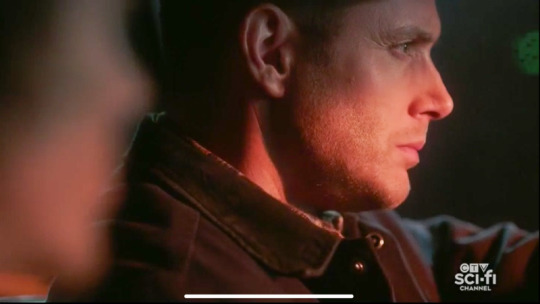

It's going to take a lot to drag me away from you; there's nothing that a hundred men or more could ever do.
Crappy hotel. We haven't actually been informed of their location, other than it's more than seven hours away from the bunker. (I know. No one else cares. Move along.) "It looks smaller," says Sam. So they've been here, not just to this mysterious unnamed town, but to this actual hotel. "Yeah, or we're bigger," says Dean. So they haven't been here since they were young. And it must not have been a great visit, because neither is thrilled about being back.
The guys open their car doors, and then we see two pairs of knock-off Converse exiting the car, which is nicely done. Teenchesters! It's January 1993, and the boys are being dropped off at the hotel/beer store. Sadly, Dean isn't played by Dylan Everett. I know I hated on the kid when he was in Bad Boys, but the way he channeled Jensen in the Hansel and Gretel episode just made me fall in love with him. Young Dean is annoyed that he doesn't get to go on the hunt with John, and points out that Sam doesn't need him, since he himself was babysitting Sam when he was the age Sam is now. "I'm pretty sure that's illegal," says Sam, as if he didn't live through A Very Supernatural Christmas and has forgotten that yes, Dean did babysit him for multiple days at a time when he was 12. I kinda like young Sam here. He's no Colin Ford, but he's not bad.
Sam's being cagey about wanting to just go to the room, and trying to hide something under his jacket. Badly. So of course Dean grabs it. It's a 2-year-old guide to colleges that he stole from their previous hotel. "I thought your imaginary friend told you it was bad to steal," Dean says, and oh, thank you Continuity Fairy for remembering Sully.
Wait? You think you're gonna go to college?
Yeah. Why not?
Why not? Why?
Cause that's what normal people do.
Right. Because WE'RE normal. Whatever. We barely go to school. So if you think places like that will even think about letting a dumbass like you in? Come on. This, Sammy? This is our life.
OH SAM. Sad Winchester music plays as Sam unpacks his weapons in the ugly hotel room and contemplates his future, or lack thereof. Meanwhile, Dean is pleased to find an old vending machine in the hallway. The same one was present in the NOW. Probably the same candy from 1993. He presses some buttons and gives it a nudge and voila! Free candy. He's surprised by a teenage girl who tells him to freeze, and I don't really think 16-year-old Dean Winchester would be so nervous just because another teenager caught him stealing from the vending machine. I think he would have laughed it off.
{Sidebar: Drinks cost $1. Isn't that a bit much for 1993 prices? Discuss.}
The girl asks Dean to show her the trick and introduces her little brother, Travis. So first it's weird that she introduces Travis but doesn't give her own name, and second it's weird because oh, holy crap, Travis is a live version of the dead kid from the NOW. So if this is the dead friend Travis, that means he was haunted by... a dead version of him as a child? That's new. I'm into it. The girl introduces herself as Caitlin (Caitlin of the text message!) and says her mother works at the hotel.
2020. Present-day Caitlin sits sadly in a diner. She recognizes Dean instantly, even though earlier this season, people made a big deal about Dean not looking like his 15-year-old ID photo but OKAY. She gets some nice Winchester hugs and tells them how rocky Travis's last 25 years have been. He was in therapy, which helped until he did some "immersion therapy" and checked into (duh duh duh) room 214. She also confesses that the funeral was last week, but she lied because she was afraid they wouldn't come. "I think she's back," she says. So Caitlin hasn't seen them for 25 years, and she knows they hunt monsters, and she thinks they'd be more likely to come because of a funeral for someone they met 25 years ago and haven't communicated with since and not because a monster needs killing but OKAY.

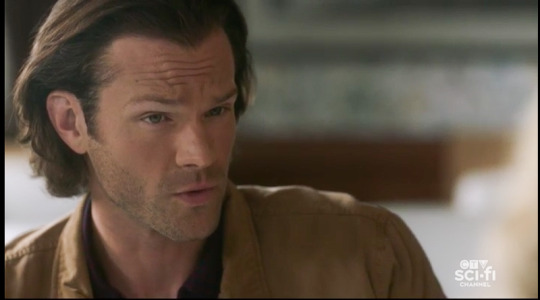

Maybe she just wants to take the time to do some things she never had.
1993. Wait a minute. It just occurred to me that 1993 isn't 25 years ago. That would be 1995. (Someone please check my math. It's not a strong point.) So did Sam and Dean actually see Caitlin and Travis two years after all of this happened? Or are we playing fast and loose with the timeline? Or counting the two missing years somehow?
NO ONE CARES. MOVE ALONG.
1993. Travis tries Dean's vending machine trick, but a scary monster lady inside the machine grabs his hand. When Dean and Caitlin show up, there's no evidence of the scary monster lady, but I bet Travis will never eat another My Delight bar.
2020. Room 214. Sam runs the EMF meter while Dean reads the coroner's report. He calls it "open and shut," because Travis's fingerprints were on the broken bottle. Because, of course, dead child Travis and alive-at-the-time adult Travis had the same fingerprints. Caitlin is still convinced he wouldn't have killed himself. But they've found no EMF, no hex bags, nothing to indicate monsters. Dean thinks coming to this room might have just been too triggering.
1993. Dean has unsuccessfully tried to contact John. Why, asks Caitlin? Because monsters are real and we kill them, says Dean. "It's kind of the family business," he says, giving young Sam a significant look. Don't you forget it, kid. He asks about any other weirdness in town, and it turns out there are three missing children.
2020. Caitlin is disappointed that the Dean who believed in her brother's monster 25 years ago doesn't believe now. But he thinks it couldn't be the same monster, because it preyed on kids. And there are no missing or mysteriously dead kids in town. And he killed it.
1993. The Scooby gang gathers to research the case. Sam, bless his researching little heart, uses candy to mark relevant spots on a map. And there's an abandoned cannery in the area. Bingo! Dean goes off to kill the monster on his own, even though they don't know what it is. He's got a gun and a knife and he figures that will kill whatever it is. Oh, Dean. I don't think your father would agree. He refuses to let Sam come, telling him to stay here and "be normal." Cold, dude. He also rebuffs Caitlin's decision to come. "This ain't the freakin' Goonies. None of you has been on a hunt before. Just stay. I got this."
{Sidebar: Didn't Sam leave Sully to go on a hunt? Wouldn't that have been before this?}
Abandoned cannery. As Dean picks a lock to break in, Caitlin shows up. Girl's got gumption. Although she gives Dean a hard time the entire time, so I don't think she's such a great partner. At one point he tells her to stay back and she actually listens, which is convenient, because it means she doesn't see the pile of things obviously taken from the missing children. Along with a key to their very own hotel, for room 107. He pulls back a tarp, and we don't see what's underneath, but we know it's horrifying. He quickly leaves the room and tells Caitlin he didn't find anything. "She's not here."
While this is happening, Sam and Travis are playing Boggle back at the hotel. See, children, back in the day, we didn't have Words With Friends or Wordscape. We had analog.
Sam comes up with sam kill you now which is gloriously freaky even though you're not supposed to use proper names, and now I want a fic with a ghost threatening Sam through a word game. (Actually, on rewatch,Sam isn't one of the words he found, he just wrote his name at the top of his list.) Travis has come up with an equally chilling set of words:dead death kill you now.

I'm hoping to find some old forgotten words or ancient melodies. But if Dean had been playing, I'm pretty sure he would have found PIE.
Then the board starts jumping and I'm all ready for it to very clearly spell out something very threatening, but all we get are a few minor changes.
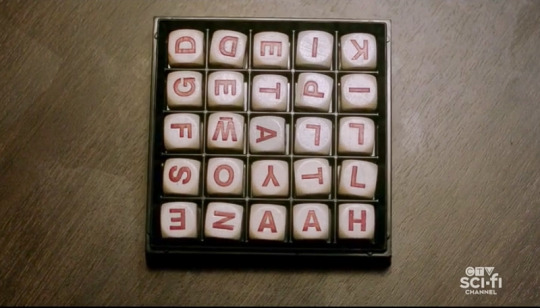
But if anybody wants to interpret, I’m here for it.
Then the lights go out, the Boggle game explodes, and the monster shows up behind Travis. She grabs him, but Dean enters just in time. He swipes his knife at her, cutting off several of her fingers. One is wearing a large ring. Then he stabs her and she disintegrates, leaving the ring on the floor. Also, it's the first time I've noticed Dean is wearing the Samulet. Aw. Better days, friends.
2020. Dean stalks down the hall. Something flashes through the hall behind him. "Sam?" he says. Not Sammy. A figure appears at the end of the hall. As the lights flicker, it quickly (creepily!) shows up in front of him. Oh, it's young Dean! Dead version! "Hey, Dean. I've been waiting for you." He nods at a knife in Dean's hand. "You know what you have to do. You failed. Say hi to Travis." Dean sinks to his knees and holds the knife to his abdomen, but before he can plunge it in, we hear Sam say "Dean?" Dean's vision clears and the knife in his hand disappears. So, there was never a knife? Meaning he couldn't have actually committed hara kiri here in the hall? No threat, then? "She's right," he says. "Caitlin's right."

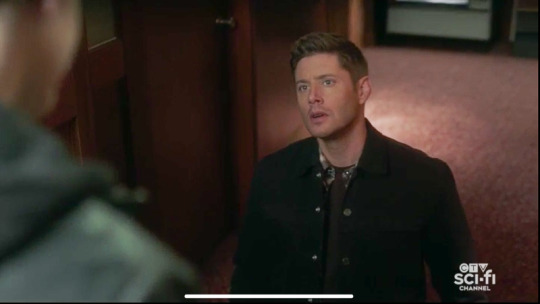
Hurry boy, she's waiting there for you.
Bar. Dean apologizes to Caitlin for not believing her, and blames himself for Travis's death since he didn't kill the monster after all. "Second chances," says Sam, kind of lightly given the circumstances. Sam starts to head out to check the lore, but Dean reveals that the monster has a nest. Which he saw, along with a bunch of bodies, when he was a kid. He didn't tell them "because I'd never seen anything like that before." I actually think he'd probably seen worse at that point, but maybe not a pile of teenage victims. Anyway, he called the cops about the bodies and then "shoved it down the old memory hole." He apologizes to Sam for not telling him earlier.
"No, man, it's okay," says Sam. "I mean, you were just a kid. We were both just kids. And hell, we used to keep a lot of secrets from each other." Yeah, it's a good thing you don't do that any more, isn't it?
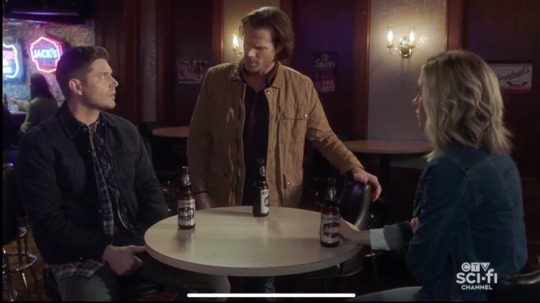

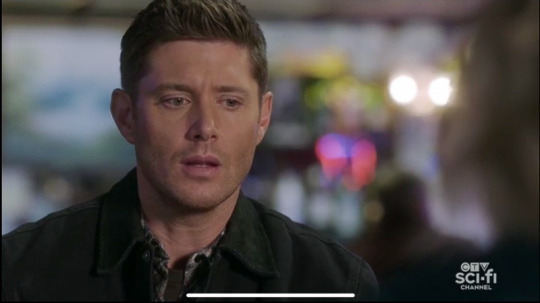
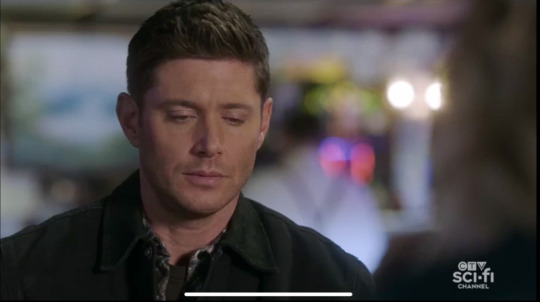
You can't hide your lyin' eyes, Dean Winchester. Which is a completely different song, but from around the same time period, so.
Dean says he'll get food while Sam and Caitlin look into the lore. And if I were Caitlin I'd be all, lore, right, but sadly I'm not.
Next we see Dean back at the diner. "Let me do two burger meals, one veggie burger meal, and, cause I know my brother's gonna ask, do you have arugula salad? Or kale?" I love this, I do. Unfortunately, Sammy's gonna get iceberg lettuce. With ranch. As the waitress walks away, she reveals Billie sitting next to Dean, which is also nicely done.
Billie's annoyed that Dean is working a case. She tells him Chuck just destroyed the last of his other worlds, so he'll be back soon. And she's given Jack his final orders to transform him for the Big Bang 2.0.
Yeah, filling him up with your cosmic TNT so he can die. How'd you talk the kid into that one?
I told him the truth. Jack killed your mother, and all he wants is your forgiveness. And I surmise that the only way he can get that is ending God and freeing you from the - what did you call it - hamster wheel. Was I wrong?
Oh. Dammit. She's not wrong, and I guess this is why it was so important to let us know a couple of episodes ago that Dean still hasn't quite forgiven Jack. And I see, in my completely unspoiled way, how it's going to play out. Dean's heart will grow three sizes and he'll forgive Jack and decide he doesn't want him dead after all... just like the end of s14. Just exactly like that.
Well. On to better things. Like Sam, in a less orange version of room 214, sitting in front of a computer. Pity he hid this dark red shirt under a jacket. It looks nice. Very nice.

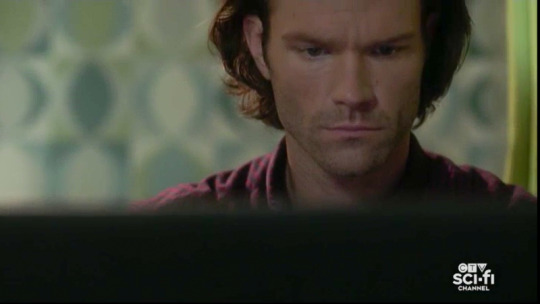
Sleeves rolled up, even. Damn, boy. Bless the rains.
Caitlin says she's sorry this is his life, and asks if he ever wants to be normal. Oh, Caitlin. It seems like a simple question, but it's not. "Well, we help people, you know?" he answers. "Save them." I mean, not your brother, but you can't win them all.
Diner. Billie tells Dean he won't see her again until the end. "According to Chuck's book, I'm not in this part of the story." Billie seems to put a lot of faith in those books of hers, considering that the one about Dean and Michael was completely wrong. {Sidebar: Or was it? Discuss.} She wants his assurance that they don't have a problem, and he is happy to assure her that he wants Chuck dead, damn the cost.
"And your brother?" she asks. And I love the way Dean looks down into his lap, like a little boy caught in a lie, when he says "He'll get there."

A sweet little boy who is a lying liar who lies. You know that you must do what's right, Dean.
Billie is not happy, at all, to hear that Sam isn't in on the plan. That's a loose end, and she doesn't like loose ends. She warns him to get his crap together.
{Sidebar: Have we ever seen Billie happy? Discuss.}
Hotel. Sam figures out the monster is a baba yaga - a witch that feeds on fear. The giant ring she wears is technically her heart, and is the source of her power. Caitlin notices that the ring worn in an old illustration is the same ring Travis had. Must be some kind of scary accurate illustration. Also, Caitlin must have better eyesight than me, because I can't tell anything about a damn ring. Anyway. Their mom found the ring in the vacuum cleaner and gave it to him. The stone was broken, but he liked the ring and wore it on a chain around his neck. He actually had it fixed a few weeks before he fell onto a whiskey bottle. Sam remembers that Dean cut her fingers off, and theorizes that stabbing her didn't kill her, losing her ring did. Apparently the power of the ring was in the stone, then? But Travis presumably replaced the stone? So why would the replacement stone have any power? Anyway, Sam goes on for a while without realizing Caitlin has actually left the room, which is kind of cute. Caitlin goes out to her car and opens a box marked New York State Coroner, so at least we know what state they're in.
(NO ONE CARES. WE KEEP TELLING YOU, NO ONE CARES.)
It contains Travis's last effects, but the ring isn't on its chain. Frustrated, she shut the box and the trunk and oh, crap. There's grown up dead Travis. "Hey, Sis." He holds up the ring. "Are you looking for this?" Scream!
Dean arrives with his bag of iceberg lettuce with ranch dressing and other assorted meals. Sam's on the phone trying to get hold of Caitlin, but she's not answering the phone. He explains to Dean that they didn't kill the baba yaga, they just damaged her source of power. Dean calls the ring her Precious because he knows I love it when he makes Lord of the Rings references. Sam says her nest must be nearby because all of her attacks have happened at the hotel, and the guys split up. First we see Sam at the front desk, where he hears an odd noise. Ooooh, is Sam gonna be the hero? Will Sam be the one who finds the monster? (Spoiler alert: you have seen this show before, right?) No, Sam finds the front desk clerk hiding in the storeroom with a bong.
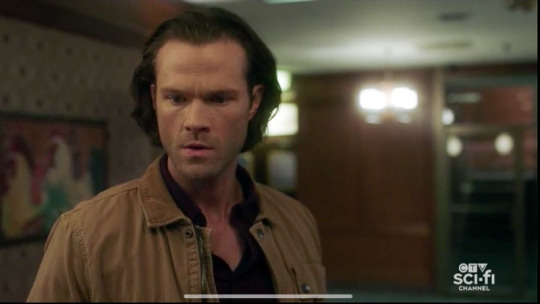
We do, at least, get a nice anxious swallow as Sam hears only whispers of some quiet conversation. With a bong.
Dean, on the other hand, walks by the haunted vending machine, listens to someone's Casa Erotica rental, and then notices a door swing open in a very menacing way. "I've seen this movie before," he says. Hee! You've been in this movie, dear. Oh, he's in room 214. Except he's suddenly back in the abandoned cannery. But this time when he pulls back the tarp over the monster's nest, the dead kid underneath is Sam. Yikes! He jumps back, horrified. I like it. Finally he finds poor dead grown Travis. He shoots him, but of course it does nothing. Travis, aka the baba yaga, agrees that he normally eats kids, but right now he's starving. Honey, it's okay. You don't have to be starving to want to take a bite out of Dean Winchester. Or just a loving little nibble. We all understand.
In the real world, Sam walks down the hallway. He hears the struggle in room 214 and we see Caitlin unconscious on the bed as Dean fights the witch. Sam runs in, knife drawn, and this is where he gets to kill the monster, right? Ha ha ha nope. He does stab her, though, which distracts her to the point that Dean can remove her ring and crush it. She goes up in green flames. Mission accomplished!
Aftermath. Caitlin thanks Dean and asks if he was scared. "Always am," he says. She remarks that he's changed, since old Dean wouldn't have admitted it. What, a 41-year-old man isn't exactly like the 16-year-old you knew for a few days? Shocking. Then she says "What do they say about getting older? You tell the truth more because you know that lies, they don't make anything better." NO CAITLIN, THEY DON'T SAY THAT. NO ONE SAYS THAT. LITERALLY NO ONE HAS EVER SAID THAT ABOUT GETTING OLDER.

He turned to me as if to say, no, Caitlin, that's not a thing.
1993. Caitlin hugs young Dean. He gives her his number in case anything ever happens that's... "you know." {Sidebar: Cell phones weren't really a thing back in 1993, so what number did he give her? And how did it still catch up with him 25 years later?} Sam asks if he ever found the other victims of the monster and he says he didn't. It's a theme! Then the Impala pulls up, but before they get in, Dean stops Sam and says "About the college thing..." And my heart sank. Because I knew Dean was going to tell him it was okay if he wanted to go to college, that he was good enough and smart enough (and gosh darn it, people like him... sorry, I couldn't resist) and that he'd probably do great. And I did NOT want to her this bit of retconning. So I was very pleasantly surprised when Dean just said "I don't know, but we do make a good team, right?" Then the boys climb into the Impala. We can only see John's arm, but if they'd let Matt Cohen direct this episode instead of last week's, we could have seen all of him, and that would have been an even more pleasant surprise. Oh well.
2020. Impala. Sam tries to call Cas, and Dean tells him to hang up.
I got an update. While you and Caitlin were researching, Billie paid me a visit.
What?
It's go time. Chuck's done with all the other worlds and he'll be here any day, and when he does, we gotta act fast. And there's something else.
Something else?
Jack's gonna die. Apparently it was always part of Billie's plan, Jack's known this whole time. And he's ready to sacrifice himself, so in order to kill God and Amara, Jack has to die.
Wait, so Billie just told you this while you were grabbing burgers?
No. Cas did, before we left. Before we even got the call about Travis.
So you've been sitting on this. What the hell, Dean? I thought we were past stuff like this!
I know, Sam-
I can't believe you, you know that? I mean, how can you keep me in the dark about something so huge?
Because I knew you couldn't handle it! You didn't trust Billie's plan, and then when we found out about Amara, you started second-guessing. You raised these ethical questions!
I shouldn't? Jack's gonna kill himself and I should just shut up about it?
Yes!
No!
This is how we end Chuck, okay? This is the only way we'll ever be free! So I'm sorry, Sam, you don't get a choice! We don't get a choice!
Oh, WE.
...
Look, man-
Stop, all right? Just stop. Please.
I'm sorry I had to-
Don't. Don't. Don't. Just, just drive. Just drive.
Ouch! Sam's face, when he realizes Dean's been hiding this from him. It makes my heart hurt. And thus we end, on a car ride very different from the one we began with.
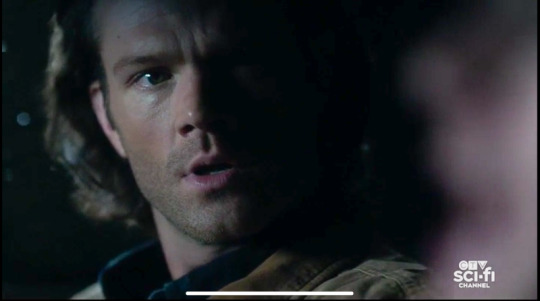
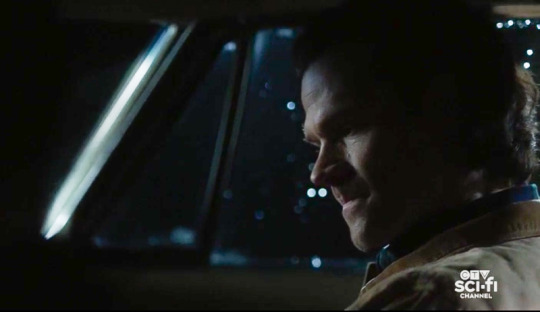
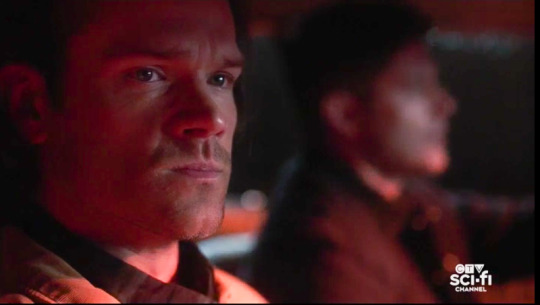
Frightened of this thing that I've become.
So, I was pleasantly surprised to get another MotW case with very little mytharc. But not real thrilled to have the brothers at odds. And dumbfounded at Cas's inexplicable failure to talk to Sam about Jack's planned death. (Yes, I know, it's explicable, but "stupid plot reasons" isn't something I accept.) All in all, it could have been worse, I guess. But is "could have been worse" good enough when we're so close to the end? (The irony is that there is at least one Buckleming episode waiting for us, and I'm sure I'll be dying for "could have been worse" after that one.)
Anyway. Please help me stay unspoiled, including episode titles and casting information. And remember, I love you all as sure as Kilimanjaro rises like Olympus above the Serengeti.
14 notes
·
View notes
Text
Dragon Ball Z 209
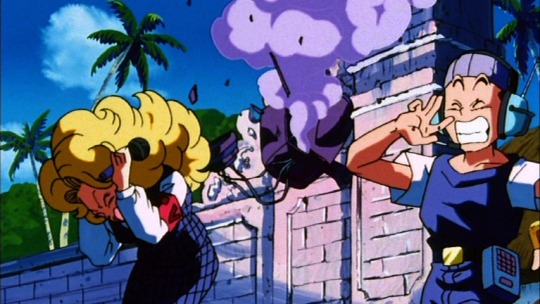
This is the “Fuck All Cameras” Episode, which is kind of awesome, but also a little outdated in this age of smartphones. If Piccolo blew up my phone just to keep me from taking pictures of his friends, that’d be really inconvenient. My boarding pass for the flight home would be on there, for example.

We open on this dude, who’s just doing martial arts stunts for a crowd of bystanders. Who is he? We never find out, but he does look pretty cool.
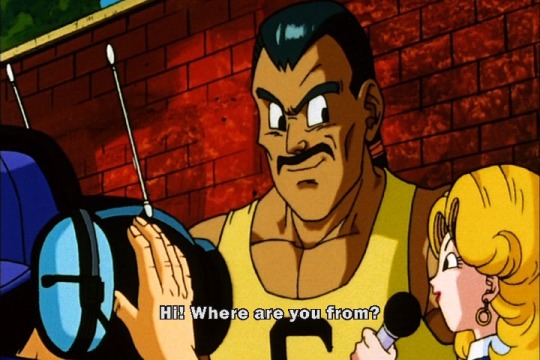
This somewhat less cool-looking dude shoves him out of the way before we can learn anything about him, and this reporter lady starts interviewing him instead.

So it’s the 25th Tenkaichi Budokai and Videl’s here to enter, but she also specifically wants to fight Gohan, so she’s trying to find him. Instead she runs into Sharpner, who for some reason is now madly in love with Videl. I mean, I don’t blame him, Videl’s awesome and all, but we saw none of this in Sharpner’s previous appearances. He sat next to her in school, so I guess he was trying to get close to her until he was ready to shoot his shot. But now he’s wearing a suit and offering her a bouquet of roses, so this seems awfully sudden.
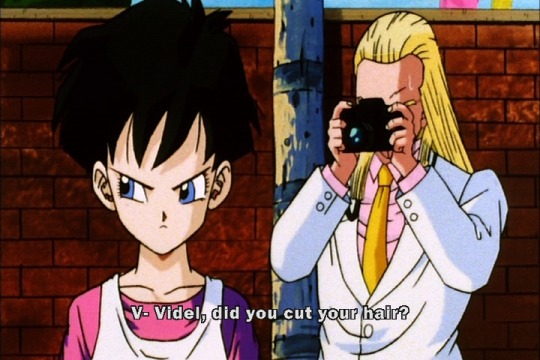

Basically, Sharpner’s throwing out everything he knows to try, and he can’t even get Videl to turn around. This is downright painful to watch. Some dork probably told Sharpner to “just tell her how you feel” and here he is doing it and he’s going down in flames. You can make the argument that his approach here is kind of crappy, but it doesn’t matter, because he doesn’t have a chance here and he never did. Videl didn’t cut her hair for Sharpner, she did it for the boy who taught her how to fly. There’s no topping that, and he doesn’t even know that’s what he’s up against.
I don’t know, I feel for Sharpner here. That feels weird to say, because he’s presented as kind of a dick, but he’s not that bad. Yeah, he tried to pick on Gohan a little, but by the end of the day he respected him for being tougher than he looks. Vegeta beat the shit out of Gohan multiple times, and everyone loves that guy. I’m not saying Sharpner “deserves” Videl or anything, but it sucks that he clearly worked up a lot of courage to make this big play for her affections, only to find out that he’s a bit player in someone else’s story.
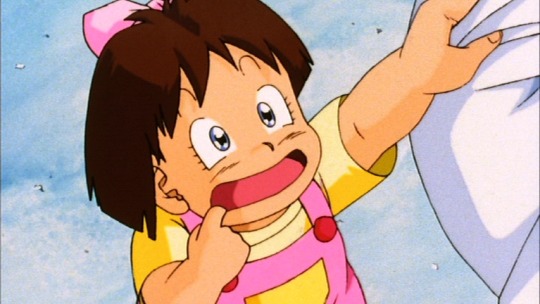
Likewise, this little girl overheard Sharpner’s invitation to go to some stand that sells fruit juice, and she’s smitten. Sharpner’s the handsomest guy she’s ever seen, he’s really old, like maybe ten. He’s offering to buy her juice and she’s taking him up on it. Apple, please! But alas, he wasn’t talking to her, and she’s just a bit player in his story, just as he is for Videl’s.
This is why I don’t respect people who just blow this story off as being nothing but guys screaming at each other for ten episodes. Yes, it has that. It makes time for that. But there’s also a lot of exploration of the human condition in this thing. You just have to be willing to root around for it.
Now, let’s hurry up so we can talk about the Punching Machine.
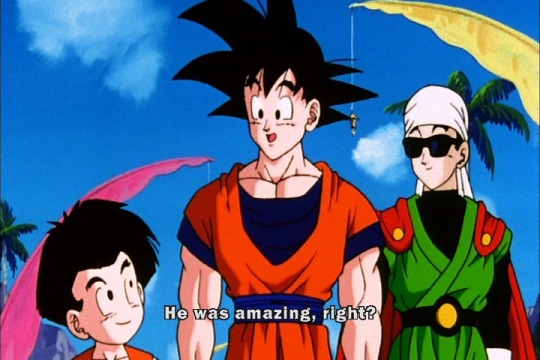
This shot of Goku strolling through the tournament grounds is awesome. He’s got his best friend and his grown-up son with him, it’s just really great to see. The funny thing is, Goku’s only been absent from the show for a handful of episodes, but it still feels like it’s been seven whole years. It’s just awesome to have him back, and in his old stomping grounds, ready to kick some ass and hug some children.

Trunks isn’t sure what to make of Goku, but he thinks his own dad is stronger. Goten replies that Gohan always said Goku was the “strongest in the universe”, which is weird because Gohan was demonstrably stronger than Goku before he died. Modesty’s one thing, but it’s strange that Gohan would just flat-out say something like that. I mean, Gohan honestly had no idea that he had surpassed Goku until Goku asked him to fight Cell. Could it be that he still can’t accept his superiority on that day, even after all this time?
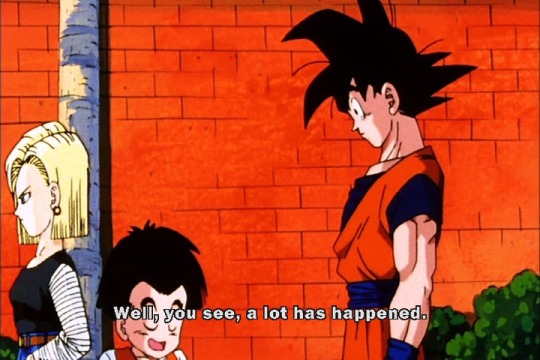
Goku can’t get used to seeing Krillin with hair. He asks why he stopped shaving it, and 18 walks by. Well, it’s not because 18 likes the hair better. She shaved his head in Res F and seemed to like him better that way, or at least that was my take.
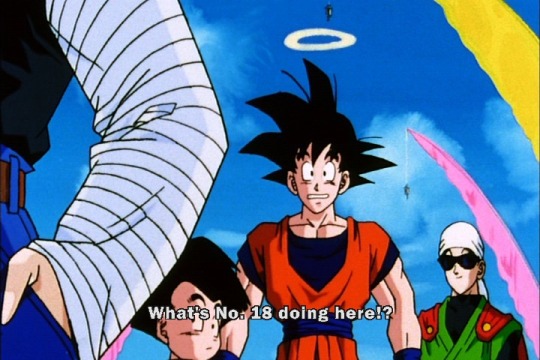
Then Goku finally notices 18 and he’s all “What’s she doing here?”

And Krillin’s like “Me, Goku. She’s doing me here. That’s your answer.”
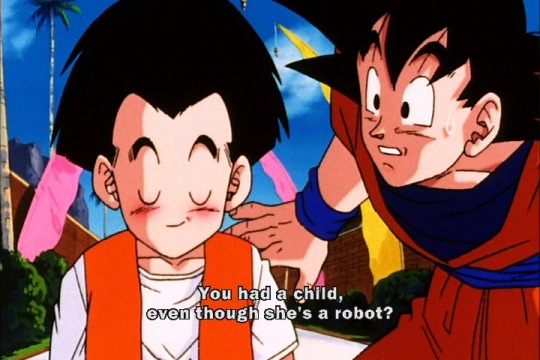
Goku’s all “How’d you have a baby with a robot?” and Krillin has to explain that 18 was never a robot, just a human with cybernetic enhancements. This is a polite way of saying 18 has reproductive organs. This feels like a bit of a retcon to me. 19 and 20 had entire chunks of their bodies chopped off, and they appeared to be wholly metallic, except for some fluid that might have been blood, and Dr. Gero’s human brain. 17 and 18 claimed to be modified humans, like Gero/#20, but we never saw either of them take any heavy damage, so it was never clear how much of them was still human. At the time, it didn’t especially matter, but once 18 settled down with Krillin and had a baby, it was worth clarifying that this was possible for her. But if she had been in some epic battle and half of her face got ripped off, she’d probably turn out to be metal underneath, and the implication would be that she was just a brain in a robot body like Gero. It just depends on what direction the character went in. Schrödinger’s uteurs.
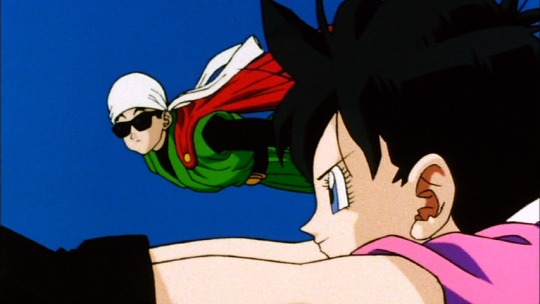
Later, Gohan runs into Videl, but he explains to her that he’s entered as the Great Saiyaman, so she has to call him that for the whole day. Then she shows off her flying ability to him, but she gets kind of frustrated that she can’t keep up with him.

Then Sharpner runs into them, and he quickly gets the impression that Videl is sweet on this Great Saiyaman person, if that is his real name, which it isn’t.
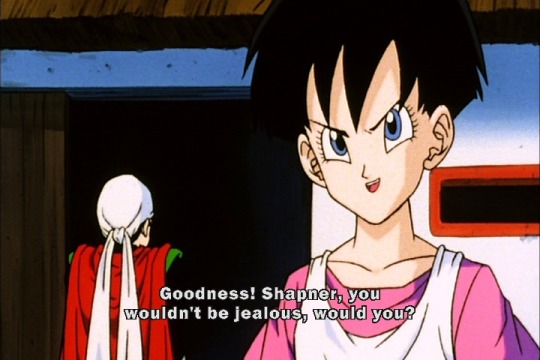
Gohan tries to leave, probably because he’s afraid Sharpner might recognize him from school, but Videl decides to play along. She doesn’t actually tell Sharpner that she’s dating Great Saiyaman, but she doesn’t deny it either. You can tell from the way she smiles that she enjoys watching him think about it.

Also, when the tournament contestants are summoned to the preliminaries, she takes Gohan’s arm in hers, just to twist the knife. Gohan’s even more unnerved by this, because, as Uncle Raditz once told him, he’s one of the mighty Saiyans too.

Speaking of Raditz, is that him posing in his underwear for a bunch of fans? Is that Luffa on the far left? Computer, zoom in sector 4 and enhance!
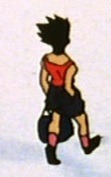
I mean, it’s not the standard color, and I’m not even 100% sure that’s supposed to be a woman, but the skin tone and the swagger are there. This isn’t a fan, either. You can tell by the gym bag she’s carrying....... which must contain her usual fighting clothes. It’s perfect. Anyway, she’s here to scold Raditz for skipping Tail Day.
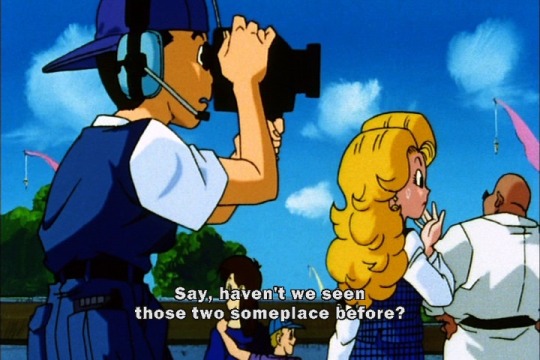
So this reporter and camera crew are trying to get interviews with the contestants, but Vegeta and Piccolo blow them off.
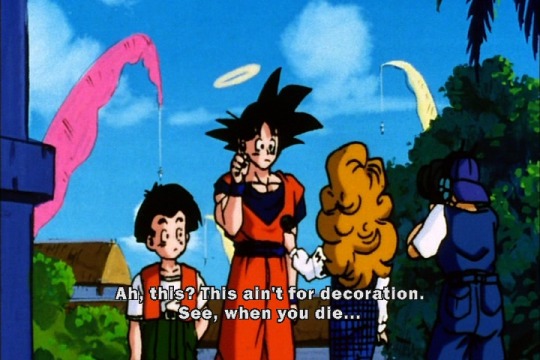
Goku’s more accomodating, but they don’t understand what he means when he says he’s dead and he’s only visiting for the day.

And that’s when Piccolo gets fed up and starts blowing up cameras. Maybe he just doesn’t want Goku explaining the afterlife to the media?

Then we see this dude signing autographs... Is this Jonathan Joestar?
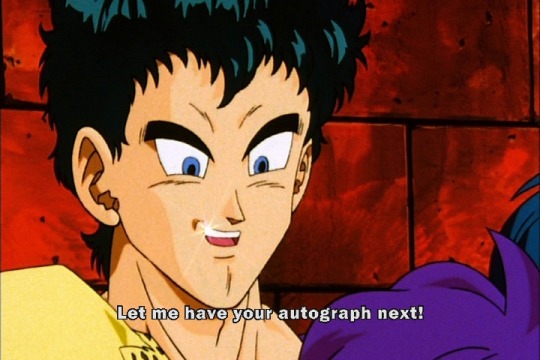
I mean, am I on drugs today? This episode is full of cameos. I came for the exploding cameras, but I stayed for the JoJo references and OC photobombs.

Meanwhile, Sharpner has made it his business to unmask Great Saiyaman and expose his identity to the world. Not sure how or why that would improve his standing with Videl, but I think at this point he’s just upset and this is the only outlet he has for his anger. I would give him credit for not stalking Videl or anything weird like that, but that may be more self-preservation than discretion. Videl would kick his ass in two seconds and he knows it.


The Z-Fighters all assemble in the area for the preliminaries, where all the other competitors are. A bunch of them are working out with weights to pass the time. I really don’t get that. This just seems like a bad time to lift, you know? Also, why bring dumbbells with you. You have to lug them around the whole time, check them on the flight, etc.
On the other hand, I totally get that guy on the left who’s stone cold taking a nap. I guess this is why I never had any talent for combat sports.
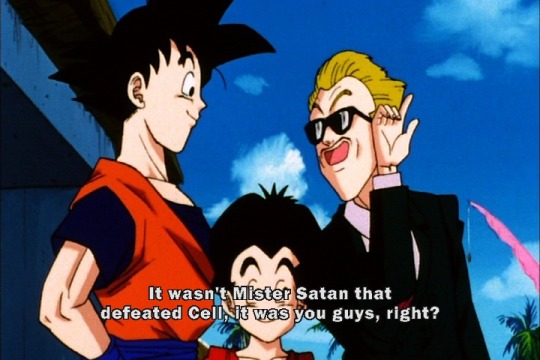
Hey, guess who it is? It’s the World Tournament Announcer! He’s still hosting this thing, and he’s delighted to see Goku, Krillin, and Piccolo return. As far as he’s concerned, these events are downright dull without awesome guys like these to make them cool. WTA’s gotten spoiled on gonzo super brawls, and now regular fighting just doesn’t do it for him anymore.
So the funny thing about all of this is that WTA is one of the few people who know that Goku and his friends beat Cell, and not Mr. Satan. King Furry figured it out, based on his recollection of Goku fighting King Piccolo, and he announcer knows it because he witnessed Goku’s battle with Piccolo Junior. That, and WTA watched Mr. Satan win the 24th Budokai, which must not have been nearly as impressive as the Goku/Piccolo battle from the 23rd.

Also, WTA is thrilled to see Goku’s brought even more cool dudes to join the action. He doesn’t understand Goku’s halo, but he still hasn’t made sense of Krillin’s resurrection from back in the day, so by now he’s just given up on trying to figure it out. He only asks that Piccolo doesn’t blow up the ring again, and Piccolo’s all “We’ll see,” which is probably exactly what WTA wanted to hear. Yeah, he doesn’t want the ring destroyed, but he likes the idea that it could happen at any time with this crew. Piccolo’s a master showman.
Does WTA remember that Piccolo’s the same guy who tried to conquer the world? He revealed himself at the 23rd Budokai, but the announcer doesn’t seem to remember, or maybe he figured out that Piccolo turned face by the Cell Games.
In any event, Gohan is pleased to see that there’s at least one person who knows and respects his father’s greatness.
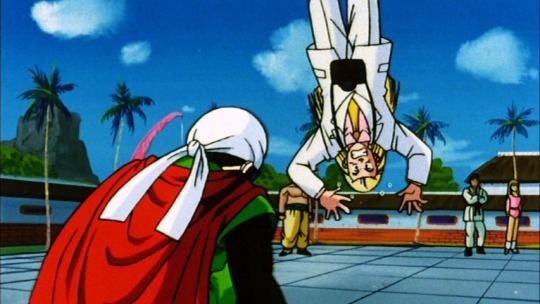
Meanwhile, Sharpner tries to jump on Gohan from one of the rooftops, hoping to pull off his sunglasses, but Gohan bends down to pick up something at the last second, so it goes pear-shaped in a hurry.
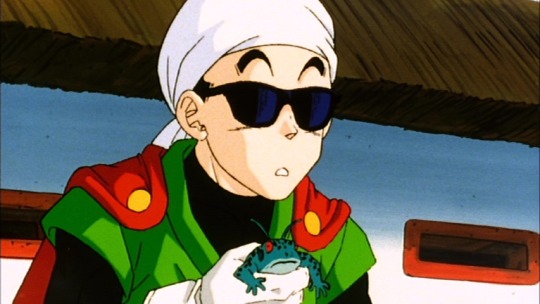
Holy fuck he was picking up Captain Ginyu! This episode is truly a cavalcade of stars!

Also, Sharpner hit the pavement so hard he cracked it, and yet he’s still alive and unhurt, which lends to my theory that even ordinary people in Dragon Ball are much, much stronger than real-world people. Bulma could kick Brock Lesnar’s ass, is what I’m saying. He’d F5 her and she’d just jump back up and bitchslap him so hard that it’d break his neck. The cops couldn’t arrest her for murder because she’d be too strong for their feeble handcuffs.
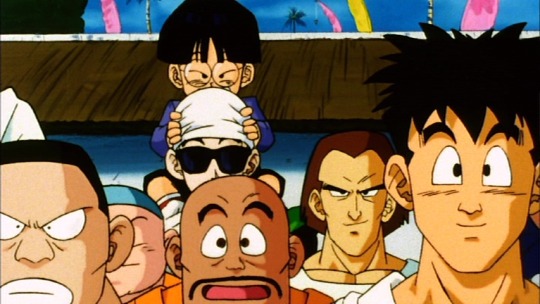
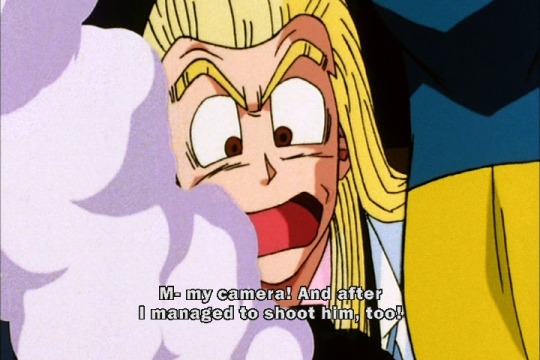
Later, Sharpner gets a kid to pull off Gohan’s sunglasses while he lurks nearby with the camera. It’s too fast for him to recognize him on sight, but he knows the camera got a good shot, but then Piccolo destroys it, along with every other camera in the vicinity. So that takes care of Sharpner.
Okay, just to explain for younger readers, back in the day cameras relied on film, which had to be chemically developed before you could see the picture you took. So that’s why Sharpner didn’t just look at the photos he’d taken before it was too late. I think camera film is still common knowledge, but I’m trying to make sure this blog post will make sense in case someone finds it on archive.org in 2030.
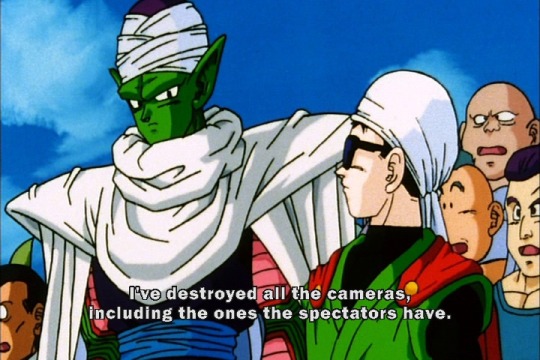
Anyway, Piccolo just flat out explains that he destroyed every camera in the area. There’s a real Ron Swanson energy to Piccolo. “I don’t like flash photography so I murdered all of the cameras. You’re welcome.” Seriously, though, he did it just so Gohan can fight without fear of his disguise falling off. He’s a good friend.

So, in past tournaments, the preliminaries were this single-elimination tournament to choose eight fighters for the quarterfinals. This time around, they have a much faster system: The Punch Machine. Basically, everyone has to punch a device that measures how hard you hit, and the top 15 scorers get to participate in the tournament. The 16th slot automatically goes to Mr. Satan, since he’s the defending champion.
While the Z-Fighters are amused and/or disgusted by Satan’s antics, I think it’s pretty awesome how he comes out, holds up his title belt, and greets the other fighters by asking “Who among you will surpass me?!” I think in the dub he shouts “Who wants this?!” referring to his title belt. He knows one of these guys might beat him. If not today, then some day, and for all his glory-seeking, he accepts that. Plus, he gets the crowd all fired up. Goku just isn’t built that way.
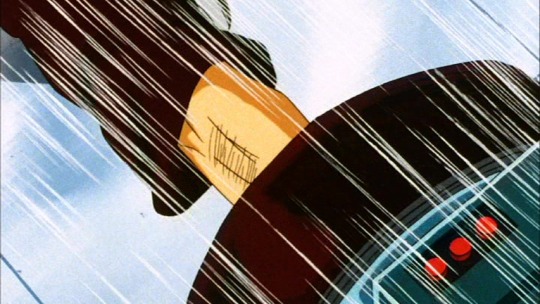
So Mr. Satan does the first punch, which I guess is meant to establish a frame of reference for the machine. It scores him at 137, and I assume everyone thinks no one else can top that, since he’s thought to be the strongest man in the world.
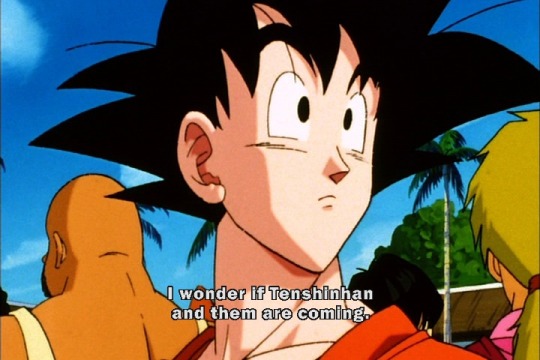
While the gang lines up for their turn, Goku asks if Tien and “them” are coming. He really doesn’t know Chiaotzu’s name, does he? Is he using “them” to refer to Launch too? Or is he just not sure of Chiaotzu’s gender? Maybe he thinks Tien married a robot too. He has no idea.
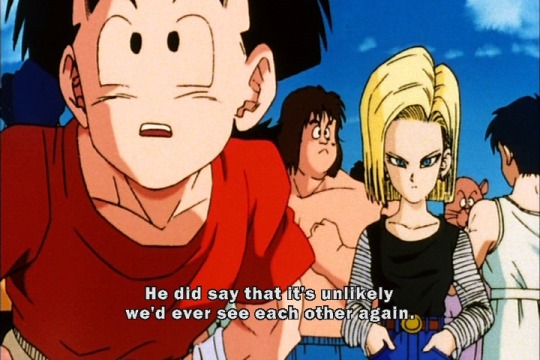
Anyway, Krillin explains that Tien probably won’t be here. “No, dude, he just looked at us and said ‘I’m leaving now. Goodbye forever.’ And then we never saw him again. Pretty sure he’s not coming.”
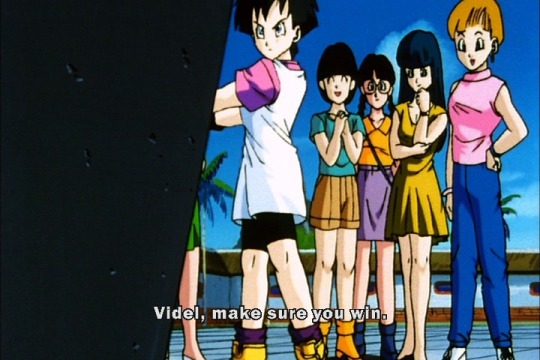
All ofthese girls are here to cheer on Videl for when she takes her turn on the Punch Machine. Are they friends from school? Where’s Erasa, then? It seems a bit odd that they’re allowed back here, unless they’re entered in the tournament too, and they don’t appear to be dressed for it.

Anyway, this Punch Machine business really annoys Vegeta. Is that Nappa behind him? Wow.
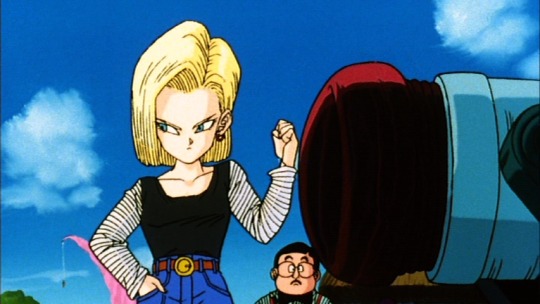
18 takes her turn, and she tries to hold back, but she ends up getting a score of 774. Whoops.
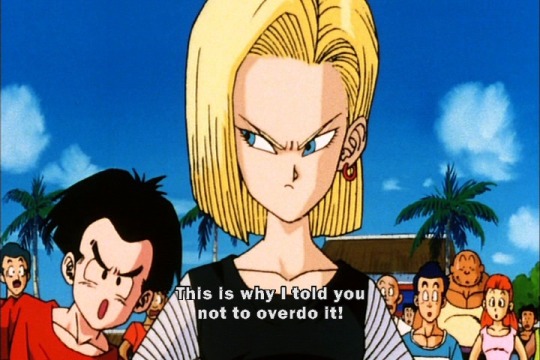
Krillin scolds her for this, because now the officials think the machine is broken. She tries again and gets like a 206, which is still suspicious, but at least they can sort of buy that.
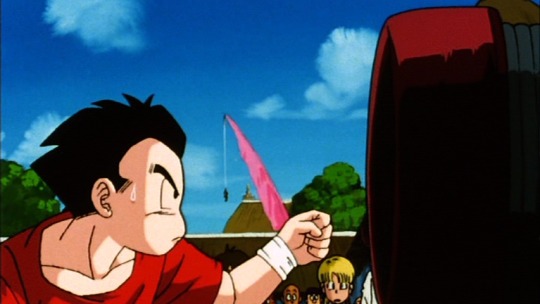

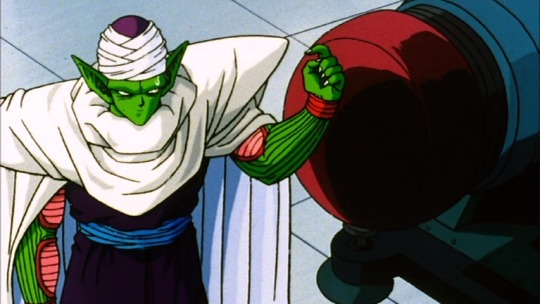
So the others just sort of barely tap it to get believable scores, but even so, they’re still higher than what the officials would have expected.
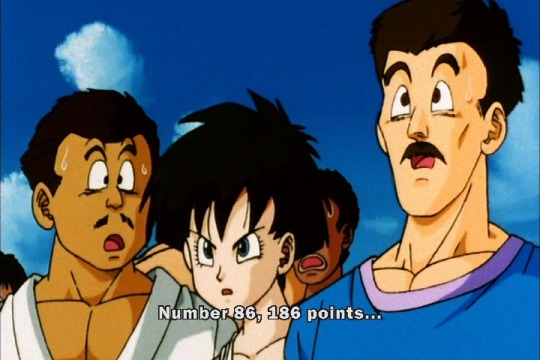
This is especially shocking to Videl, who hasn’t met the Z-Fighters yet.
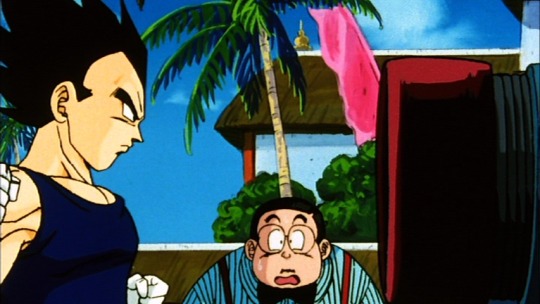
So then it’s finally time for Vegeta’s turn. As it turns out, this marks the start of an epic battle, one of my all-time favorites. You don’t see a lot of talk about this one, but Vegeta vs. Punch Machine is a real classic. Over the course of the next six episodes we’ll--

Uh...
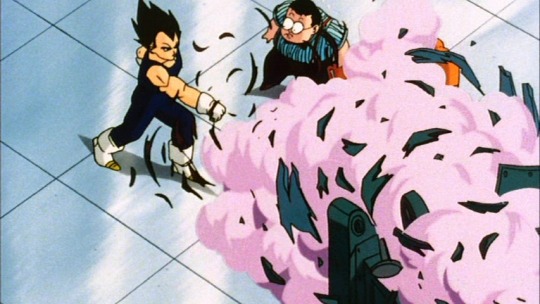
...
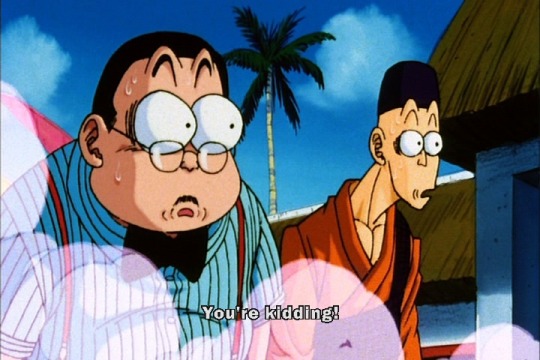
PUNCH MACHINE NOOOOOOOOOOOOOOOOOOOOOOOOOOOOOOOO

Videl is stunned. Punch Machine was her godfather, but now it’s just a bunch of scrap metal. And that red cushiony part on the front.
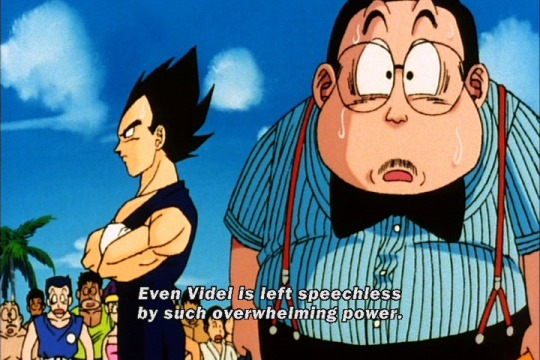
Look at this heartless bastard. He killed Punch Machine and he doesn’t even care. It had one more day till retirement. I... I can’t go on anymore.

Yeah, that’s the Great Saiyaman Saga. Not so great, actually. They should call him Stand-Around-And-Let-Punch-Machine-Get-Murdered Saiyaman, because that’s what actually happened. I guess “justice” is only for humans and cat people now. Way to drop the ball, Saiyaman.
#dragon ball#2019dbliveblog#great saiyaman saga#goku#gohan#goten#trunks#vegeta#piccolo#krillin#android 18#videl#mr satan#sharpner#jonathan joestar#punch machine#rest in punches old friend#😢
34 notes
·
View notes
Text
On Medieval Health Care and American Barbarism
As I’ve noted several times, I generally try to ignore whatever is currently passing for ‘governance’ in America at the moment, cuz I just ain’t got the patience, or ability to do all that emotional labour. However, they will keep on doing things that call back to the medieval period, so we’re gonna have to talk about it.
So currently in America, which is defo a first world country and for sure very prosperous and a good place to live, there is some debate about whether or not sick people should be driven into bankruptcy, given the audacity of their instance on being ill. (Have they tried not getting ill? IDK.)
Some Americans, who are for sure good Christians and well into Jesus, need you to know that no one should be obligated to help sick people pay for medical care. To whit:
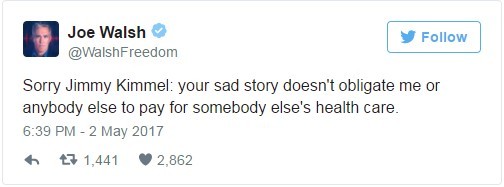
How charming.
This idea – that health care is something that requires a) payment, and b) is an individual, not a community, concern is what we’re going to talk about today.
Now, as you may be aware, European medicine was underpinned by the idea of humorism which was central to Hippocratic medicine. Hippocratic medicine itself was developed from the tradition of Greek natural philosophy. Hippocrates, obviously, gave his name to the discipline, but the Hippocratic Corpus – a series of sixty some essays on medicine – was developed by several authors and compiled around 250 BCE. Galen then came along sometime around 129 AD and updated the ideas slightly, and notably had some influence on theories of anatomy and pharmacology, but was still a stan for humor theory.
As the theory went – the body held four humors: blood, yellow bile, black bile, and phlegm. These humors, in turn corresponded to the four seasons, the four elements, four temperaments, and four stages of the life cycle like so…

More or less, the idea was that if your humours were balanced you would remain healthy. If something got out of whack, you got sick. To get better you needed to get those humors back into balance. A lot of this idea was based on observation. If you were so sick to your stomach you were vomiting bile it sure did look like you had too much and your body was trying to rid itself of it. Bad cold? Same thing with phlegm.
Medieval medicine took this classical basis and ran with it. Classical medical texts were copied and edited in monasteries and monks also wrote their own works on herbal medicine and botany based off their own observations. As groups of devout Christian men with access to medical knowledge, monks considered it to be their religious obligation to provide medical care for members of their communities.
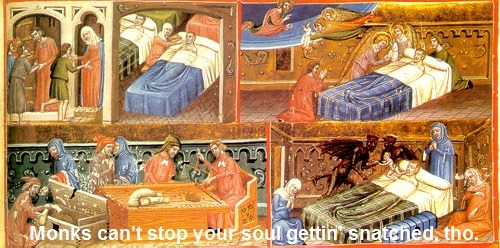
As a result, most monasteries ended up having a sort of informal hospital. Because they were actual fucking Christians.
There were a lot of other groups practicing medicine in the medieval period however. Barber surgeons, famously, did a lot of medical work that involved cutting people. Basically if you were able to keep a razor sharp enough to shave someone, odds were it was sharp enough to do minor surgery. Homeboys would do stuff like blood letting, dentistry, looking after soldiers during and after battle, and also keeping your cut fresh AF.
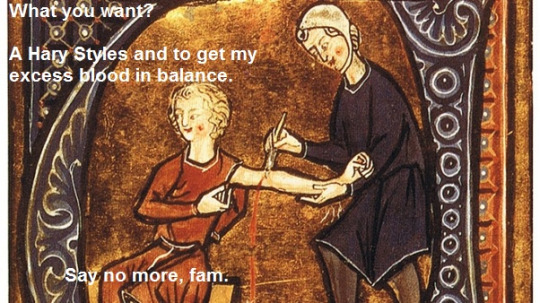
Barbers were medical professionals and for sure got paid. However, the medical services they provided were generally in reach of your average (read: peasant) medieval person.
There was also something for the ladiez to do medically – that is look after other ladiez. (Did you know that half of all people in the medieval period were actually women? No for real. I’m serious.) Midwifery was some real shit, and basically one of very few professional options for individual women at the time. (Fuck yeah the other option was sex work – shout out to my girls.)

Midwives were typically apprenticed at a young age in order to learn the trade, and had to have a reference from their parish priest as to their good character in order to do so. They then learned all about assisting the labour process. Labour was an exclusively female medical event – with men being excluded from the birth chamber. Midwives were certainly professionals, but the great majority of people (again, peasants) could still afford their services.
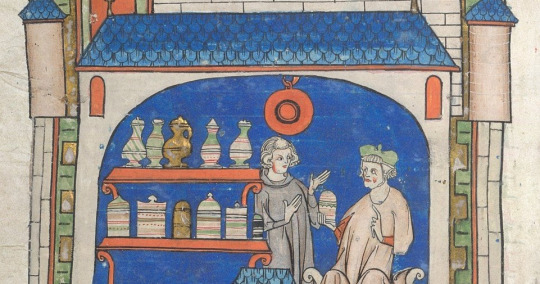
There were also straight up apothecaries who were sort of like modern day chemists/pharmacists who made drugs and medicines. By the thirteenth century they had their own guilds, and they often worked alongside other medical practitioners in order to establish what drugs should be made or
There were, of course, also dedicated physicians in the medieval period. There were several schools that taught medicine, including the much-celebrated Salerno, and later Montpellier, which is still in operation.
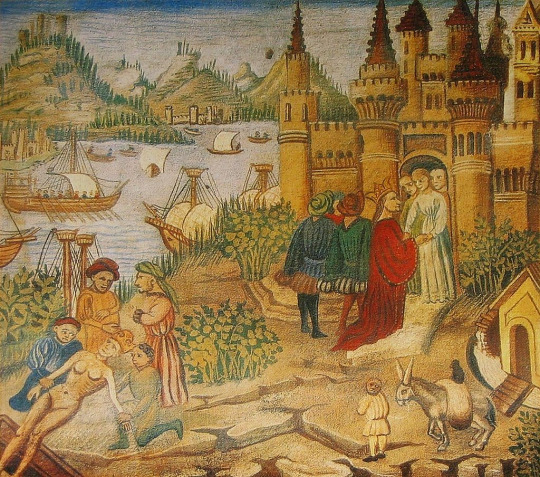
These institutions trained doctors including the famous Rogerius who wrote a killer book called The Practice of Surgery (Practica Chirurgiae) round about 1180, and also came up with the term ‘lupus’ and Giles de Corbeil who wrote a series of influential medical poems on the urinary tract and pulsology. The university system was making some pretty good advances in medicine, if slowly. People started doing more work with human dissection and learned more about anatomy. (Fun fact – high medieval Europe did not totally ban human dissection, but Pagan Rome did. Bring that up when people say the medieval period was backwards.)
The medical schools were drivers of medical thought and research and the people who trained in them often ended up working for the elite. You had to go to school for years to be licensed, and it wasn’t cheap, so you charged.
That’s where the trouble started.
After the Black Death showed up, people were not too enthused about medical practitioners. If they knew so much, why couldn’t they stop the plague?
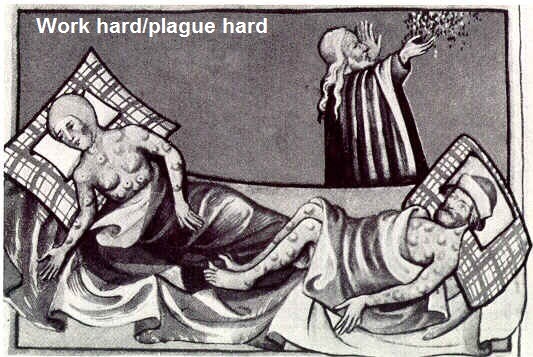
People began cracking down on non-licensed medical practitioners. If these people were actually skilled in terms of medicine then for real, why TF was everyone dying on the regular? Soon laws began to propagate stating that only licensed, i.e. university educated physicians could practice medicine. This fucked shit up.
Suddenly a lot of people who had been offering health care services couldn’t. The barber who pulled out your rotten teeth? Not licensed. Apothecaries who knew everything about how to create drugs? Part of a guild that learned through apprenticeship, not university. The monks who had killer medical libraries, actual running hospitals, and gardens full of medicinal herbs at their disposal? Only educated in the cloister.
It was even worse for women who could not go to university. In the medieval period all students had to take holy orders in order to join university, meaning that they were clergy members, if only for their time in school. Women couldn’t do that. That meant that there was no legal way for midwives to practice, despite the fact that only women were supposed to be involved in the birth of children.
So the ranks of people who could legally provide medical care suddenly dropped. Meanwhile, the only people who could legally provide it needed to see that cash money in order to provide medical care because they made a huge investment of time and money to get where they were.
In some instances, where you lived also determined whether or not you could get medical care. A trained physician would want to stay where the greatest number of potential (wealthy) clients lived. They, therefore, tended to stay in cities, or revolve around courts where their educational investments paid off. No one was going out to the country side to see to the peasants, you feel me? Moreover, the peasants couldn’t drag themselves off to a monastery for help when they got sick anymore, because monks weren’t supposed to be practicing medicine. There just wasn’t anywhere to go for help. By the early modern period, then, the poor had been stripped of a lot of the options they could exercise before.
All of this helped to create the system that America is experiencing today. Healthcare became a luxury – something that the rich elite had recourse to, and which everyone else had to do without. It is also a hugely modern ‘system’. No one is compelled by their religion to take care of the sick, despite the fact that America loves to call itself a Christian country. We compel bright young people who want to make money to go to med school, because there is a huge financial incentive. Being a medical doctor gets you paid. We do not tell them they have a responsibility to treat the sick when they are trained.
This health care system also routinely marginalises people who provide medical care but are not physicians, in particular those who are providing medical care in one of the traditionally ‘feminine’ roles. Nurses and midwives have much much more patient contact than doctors do, but are paid nowhere near as much. Hell, in America you might be paying out the nose for medical care and only ever see a nurse practitioner anyway, such are the vagaries of for-profit healthcare. So the nurse-practitioner ain’t getting paid, but you are still paying, and somehow all of this is fine and good.
None of this is to say that medical practitioners shouldn’t be paid for their services. It’s a hard job. You have to learn a lot. In the UK we really treat our junior doctors terribly and they deserve so much more. In the medieval period people still managed to treat people at all levels of society and still make a good living. The people who could afford to give away free health care in the medieval period (monks) had really comfortable life styles. The lower-level practitioners like barbers and midwives made their living on volume. There were options for patients and practitioners to enhance their quality of life.
Overall, then, while medicine has moved on from the medieval period and is much more effective – the healthcare options that many people in America have are actually much worse in comparison to what was available seven hundred years ago.
Perhaps even more distressing for enthusiasts of using ‘medieval’ to mean bad (which you should never do), is that America is a less caring society than Europe in the year 1300. Medieval Europeans were subject to strict class systems, many were unfree, and most lived lives of grinding poverty and work. Most people weren’t allowed to move down the road if they wanted to - but they were still considered deserving of health care.
Tell me one more time who the barbarians are.
169 notes
·
View notes
Link
Her baby is colicky. That’s how it begins. The only way Manoush Zomorodi’s infant son can be soothed is when she walks him in his stroller through the streets of Brooklyn. She walks for hours. Any noise sets him off, so even talking on her flip phone is off limits. She grows bored. She finds herself spacing out, her mind wandering in a way she hasn’t experienced since childhood. Years later, she has a new job as a radio reporter. She’s given the chance to host her own show. It’s called Note to Self, about how technology is shaping our lives. She sits down to brainstorm. You know, as many ideas as you can dream up. No idea is a bad idea! There’s only one problem. She has no ideas. She tries to think back to a time when ideas came easily. And she remembers: those long walks with her son. Before her smartphone. When she was bored. That’s how Manoush came up with the Bored and Brilliant challenge, in which she asked her listeners: Will you join me in a week-long experiment? Will you change your digital habits, get bored on purpose, and see what happens? Twenty thousand people signed up within 48 hours. I sat down with Manoush to find out what she and her listeners learned.
Q. Why do you think boredom can be a good thing?
Our parents always said, “Only boring people get bored.” So you think, “If I’m bored, I’m insufficient!” Then when we have our own kids, we’re told we have to make sure those little minds are constantly stimulated. We think boredom is something to be avoided. But we’ve gone to an extreme, which is that technology means we don’t ever have to be bored. Because all those little cracks in our day, those moments of walking someplace or waiting in line for coffee or sitting on the subway, are filled with our phones. The moment we get that uncomfortable feeling, we can immediately be distracted with texting or scrolling. So once I started to notice I was never bored anymore, I wondered: Is that a good thing? What would happen if we got rid of boredom entirely? Would we be missing something?
Q. What did you find out?
I discovered that neuroscientists and cognitive psychologists are coming to understand that boredom is actually very important because it’s the gateway to mind-wandering. And allowing your mind to wander—some people call it daydreaming—is necessary to your creativity. It’s the time when you take one disparate idea and another disparate idea, and you smash them together to make something new. When you’re bored, you find the space to ask, “What if?” It ignites a network in your brain called the default mode, which some scientists refer to as the imagination network in your brain.
Daydreaming is the time when you take one disparate idea and another disparate idea, and you smash them together to make something new.
Q. Is the default mode the same thing as being on automatic pilot?
So yes, physically you’re on automatic pilot, right? You’re folding laundry or you’re walking or you’re not doing anything that requires focused attention. And so you click over into the default mode, and you just kind of space out. And it turns out this default mode is where you do your original problem solving—including something called autobiographical planning. This is where you look back at your life, you build a personal narrative, and you plot out the steps to reach where you’re going to go next. When I learned this I was like, Well, what if we changed our digital habits? Could we make ourselves more bored on purpose? So I came up with this seven-step program (see page 56) to do just that.
Q. But doesn’t it seem like the state we really want is “flow,” where you’re totally immersed in what you’re doing?
Yeah, but how do you get into flow? You don’t just snap your fingers. I always think of how, when I was a kid, I’d draw and then two hours would be gone. And I’d be like, “What just happened?” It was this wonderful feeling of having lost yourself in time and space, and I wanted to feel like that all the time! But how did I get there? It requires the proverbial blank page. It requires me to feel the discomfort of “I don’t know what to draw. But there’s nothing else to do. All right, well, I’ll just start with a circle.”
And then suddenly the minutes fly by. And what I hear from young people is that the moment they could press on and get away from the bored and into the flow, that’s the moment where they’re like, I’m just going to check Instagram or get on Snapchat.
Q. You say our desire for novelty is an urge that’s as hard-wired as our desire for sugar or fat. While it’s great that technology makes it easy to find out what’s new, what’s the flipside of that?
I think of the food analogy in relation to information overload. I personally am a glutton for news and information. I just want to read everything. But what is the point in stuffing my brain with all this new information if I’m not going to use it somehow? For many people there’s also this insatiable appetite for social connection. Getting a “like” or a “favorite” is like having a piece of candy. It tastes so good! But you’re going to be hungry again really soon. So where’s the nourishment? Where do you find the satisfaction so that you’re not swiping, swiping, swiping…?
Q. It’s like we think our phones are helping us stay connected to people, but there’s a paradox there.
Yeah, like today we connect on Twitter or Facebook. OK, that’s a connection. But would I recognize you in real life? Would we be happy to see each other? Would we be able to sit down and have a real conversation? It’s OK to be connected to a lot of people on social media platforms, but I want to make sure we don’t lose sight of real connection with people. Like right now you and I are having lovely eye contact. You have these beautiful blue eyes and cool cat glasses. When you see someone eye to eye, and you’re on the same wavelength, and they totally understand what you’re talking about? That’s connection! And you can’t do that in a text.
Q. One of your listeners equated his phone to a baby’s binky. Another described theirs as a four-year-old in need of attention. How would you describe your relationship with your phone?
I would say codependent for sure. The phone needs me because that’s how it makes money for all those free apps. But I definitely need the phone. I mean, my son right now is with my husband getting an X-ray on his foot. We can be in touch all day long. My phone tells me where I need to be in the next half hour. I have all my interview preparation in my phone. So don’t get me wrong, I love my phone. But what I’ve also realized is that I have compressed time in a way that sometimes my body cannot keep up with it.
Q. Before I read your book I was kind of smug, thinking: I don’t have a problem because I’m just using my phone to be productive.
Our phones mean we can always be planning, always be productive. And I think we forget that being reflective actually helps us be productive because it helps us set goals. If we haven’t taken the time to sort out what’s important to us, then when we respond to an email, we’re letting other people set our goals for us. We’re confusing productivity with responsiveness. You know, computers have infinite capacity. Human beings do not. And that’s been a hard lesson for me to learn, particularly as a type A person who has so many things I want to do. It’s hard to get the meditation stuff into my life.
Q. So do you meditate?
I’m trying. I’ve started many times, but it’s very hard for me. I used to think I was the world’s worst meditator. But when I heard you’re supposed to fail over and over so you can just start again, I was like, Oh, I can do that!
Q. One of the habits you asked your listeners to change was to stop taking pictures for a day. What advice do you have for parents like me who take a ton of pictures because we want to capture certain memories?
Part of being a parent is knowing that these moments are super fleeting. But why can’t we be OK with the fact that we’re not necessarily going to remember a certain moment? That’s why we’ve gravitated toward Facebook: because no chapter ever has to end. No one passes out of your life. Why not? It’s a sad thing when you lose touch, yes, but things do come to an end. Life comes to an end! So I’m really trying to be more comfortable with the idea: You’re right, you won’t remember it, and that’s why every moment deserves to be savored, because the ride is short, and it’s not easy. Who told you it was going to be? Nobody.
Q. So do you think that we’re at a turning point in understanding the way technology might be interfering with our ability to space out and savor the moment?
I would not have said that when we started the Bored and Brilliant project. But I took all the data that we collected, and I also did a ton more research. And I do think people are starting to understand that the idea that tech is always going to make things better is a utopian ideal—it’s not reality. There are fundamental questions about the next chapter of the internet. And while we wait for regulation or new business models or maybe it’s a Hippocratic Oath for software engineers, that’s all going to take some time. Meanwhile we have immediate work we can do on ourselves, on self-regulating. That’s something we have to teach ourselves and teach our children in schools. The people who participated in the Bored and Brilliant challenge were able to reduce the amount of time they spent with their phones. But more importantly, they created habits—like keeping their phones out of sight, and not using them while in transit—that made them more likely to connect with their own thoughts and with other people.
You have to sit and be uncomfortable and go deep. That’s hard, but that’s where the good stuff is.
Q. You’re a fan of the tiny hack. Can you think of one small step that you would suggest people try?
I guess it would be to realize that we have to schedule time for reflection into our lives. What we’re discovering is that the constant connectivity and easy access to information and other people means that we have to prioritize things that we’ve never had to teach before like eye contact, conversation, reflection, boredom. Because the future economy will require you to sit with a problem and work it through and not move to distract yourself with something else. You have to sit and be uncomfortable and go deep. That’s hard, but that’s where the good stuff is.
ILLUSTRATION BY CAROLE HENAFF Bored and Brilliant: The Seven-Day Challenge
Here’s a chance to take a week to see whether you’re injecting enough space into your life.
Day One: Observe Yourself
First you’ll check your digital habits—and most likely be shocked by what you discover.
The important thing is to accurately report on how often you check your phone. What are you checking—email, social media, missed phone calls, the weather? Do you read on your phone? What do you read—those long emails from your mom, The New York Times, or hashtags on Instagram? When do you pull it out most? Or is it always in your hand? Are you alone, or do you use it when you’re in a meeting or with another person socially? Do you take it to the bathroom with you?
Day Two: Keep Your Devices Out of Reach While in Motion
Keep your phone out of sight while in transit—so, no walking and texting.
When you are on the bus or walking down the street, you’re not doing nothing. We think of these moments as unproductive, inefficient, or lost if we’re not checking our mail or doing other tasks.But these are ideal times for letting our minds wander.
Day Three: Photo-Free Day
No pics of food, kitten, kids—nada.
Take absolutely no pictures today. See the world through your eyes, not your screen. Instagrammers, it’s gonna get rocky. Snapchatsters? Hang in there. Everyone is going to be OK. I promise.
Day Four: Delete That App
Take the one app you can’t live without and trash it. (Don’t worry, you’ll live.)
Ask yourself: “Is this product serving me or hurting me?” When I asked myself that question, I knew I had to delete Two Dots, the game I stayed up playing well past my bedtime. I wanted to delete it. And yet the process was literally nauseating. This was by far the hardest challenge for the original Note to Self listeners who followed the Bored and Brilliant program—myself included. But if I can do it, so can you.
Day Five: Take a Fakecation
You’ll be in the office but out of touch.
Decide how long you need. An afternoon? An hour? Twenty minutes? It’s up to you. If there’s no way your boss will let you off the grid for an hour or 20 minutes, set aside time for yourself tonight. The important thing is to set a fixed period and to stick to it.
Day Six: Observe Something Else
Reclaim the art of noticing.
Go somewhere public and stay for a while. It could be a park, a mall, the gas station, a café, the hallway at work or school. Once you get there, hang out. Watch people or birds or anything that strikes you. If you feel uncomfortable lingering in a spot to observe, then you can do this exercise while walking. Just make one small observation you might have missed if your nose were glued to a screen.
Day Seven: The Bored and Brilliant Challenge
Use your new powers of boredom to make sense of your life and set goals.
Step I. Identify an aspect of your life that you’ve been confused by, avoiding, or downright terrified to think about.
Step II. Set aside 30 minutes where you’ll be completely free from distraction. Store away your phone, tablet, laptop, or any other digital device. Put a generous pot of water on the stove and watch it come to a boil. Or find a small piece of paper and write “1,0,1,0” as small as you can until the paper is full.
Step III. Immediately after you’ve completed Step II, and are mind-numbingly bored, sit down with a pen and pad and put your mind to the task of solving the problem identified in Step I. If you are a visual person, feel free to draw. If you’re a list maker, make a list. The point is to come up with new ideas and get them down on paper.
The post Tap into Your Inner Brilliance appeared first on Mindful.
0 notes
Text
Want Health Care in Arkansas? Find a Job
https://healthandfitnessrecipes.com/?p=6797
Arkansas just became the first state to implement work requirements for its Medicaid program. Similar Medicaid waivers have been approved for three other states, and seven more are pending, spurred in part by the Trump administration’s guidance last year.
Now, if able-bodied adults on Arkansas’ Medicaid rolls don’t go to work, study, or volunteer for 80 or more hours a month, they will lose their health insurance coverage in three months. A study by the Urban Institute in May estimated that, this year alone, 22,000 people, or 8 percent of Arkansas’ Medicaid population, could be subject to the work requirements and are not working.
The work requirements reflect the view, among some conservative health-policy experts, that people should be encouraged to get jobs and get off Medicaid. Many liberals, meanwhile, feel that revoking health insurance is a harsh punishment for what could amount to a lack of skills, transportation, or knowledge. Three consumer advocacy groups, in fact, sued the Trump administration to stop the work requirements.
“The inevitable coverage gaps from Arkansas’ work requirements and coverage lockouts will worsen beneficiaries’ health, which is one reason why major physician organizations oppose work requirements in Medicaid,” wrote Judith Solomon at the Center on Budget and Policy Priorities.
I recently spoke with Cindy Gillespie, a former health care advisor to Mitt Romney and the current director of the Arkansas Department of Human Services, about what the work requirements do and don’t mean for Arkansans. We met at the Spotlight Health Festival, which is cohosted by The Aspen Institute and The Atlantic. A lightly edited transcript of our conversation follows.
Olga Khazan: Do you have any concerns that the work requirements on Medicaid will cause people to lose coverage, and if not, why not?
Cindy Gillespie: We’ve started our work requirements with the 30- to 49-year-old group. Within the 30-to-49-year-old group, we’ve exempted out anybody with a child in the home, anyone who is caring for an incapacitated person, anyone who has a short-term incapacitation, drug, and alcohol rehab.
We end up with a small population of able-bodied adults who are working less than 80 hours a month and, who, as best we can tell, are not full-time students or not in any sort of activity that would prevent them from being able to get into job training, job search, education, some kind of GED, all of these different type of areas. Our focus is to get those individuals … get them working with the Department of Workforce Services, career education, someone who can help them identify what their barriers are to actually looking for a job, getting a job, engaging in the community, doing volunteerism, doing job search, all of those sorts of things.
Our focus is to really concentrate on those individuals and see if we can move them further up the economic ladder. After three months of non-compliance, a person will lose their coverage for the rest of the plan year. Not permanently. If the individual does not, for some reason, engage in that period, they can come back into the program in the next plan year.
Khazan: Why not just do the engagement into the programs and not have the stick of the losing coverage?
Gillespie: Last year we tried a work referral, where we tried to refer everyone in the program to all the different services that were available. We had an extremely low take-up rate. People just didn't pay attention. This is actually engaging, not just the individuals, but it is engaging an entire support network around them.
For example, the insurance carriers, they have a vested interest in that person now because [if] that person rolls off the insurance plan, then that carrier won't be getting paid for them anymore. They have a vested interested in putting their network to work, reaching out and getting with the person. The same with all of the groups that work around the state with different individuals. They all have a vested interest now in helping make sure that the individuals do, in fact, get into the system.
Our department of Workforce Services actually sent all of our Arkansas Works beneficiaries a letter and told them ... We want to help you get, to education, to job training, to job search, to what you need.
You are seeing a lot of engagement that I don't think you would see unless everybody had got really excited and involved in the program. The media even in our state, they were great at doing sessions with different advocacy groups this week. Helping them understand how this works, what to do, that got covered by the media. Lots of things are letting more people know.
At the end of the day all that creates more knowledge, not just from those who have the work requirement but among all of those who don’t. Now they are going to see more and hear more about the services that are available. We find, constantly, people don’t know of the services that are available. When you tell them, they don’t pay attention. Now we are hoping they will pay attention and take advantage of the services.
Khazan: Do you anticipate that a lot of people will lose coverage as a result of the work requirements?
Gillespie: I got asked this yesterday by somebody. They said, "You are doing it for savings.” I said, “We have not taken any saving in our budgets. We did not take any for this year. We have not taken any for next year. We have left it at the assumed rate of everyone staying in.”
Khazan: So you don’t anticipate anyone losing coverage?
Gillespie: I can’t say that, obviously. We have a massive amount of churn that goes on. I think last month we had about 5,000 people that came off of Arkansas works, due to some accuracy efforts we have going on. There is a massive churn that goes on in these programs, there will be people who roll on, there will be people who roll off. I won't know until September whether or not, there’s any that actually lose their coverage for the remainder of this calendar year because they did not do anything over the next three months.
Khazan: Is there a concern at all, that if someone does lose coverage as a result of this change, that will actually make them less likely to work or to do some of these activities that you are trying to encourage?
Gillespie: Your question presupposes that someone who is working and meeting their requirements loses their coverage. If they are working, they are not going to lose their coverage.
Khazan: Is there a possibility that this rule could get expanded to include people who are of different ages; or who have children in the home; or some of other populations that are excluded for now?
Gillespie: That would be way down the road. We are rolling this out over two years, this year is the 30-49 year olds. Next year is 19-29 year olds. That is as far as the program has been set up at this time. We are just starting with one group, working and focusing on them, learning lessons from that and then next year we will take the next group.
Khazan: They are supposed to show their progress online, through an online form. Is that still the case?
Gillespie: Yes.
Khazan: What happens to people who don’t have internet access at home?
Gillespie: If there is someone who can not access the portal, either because of what you said or because perhaps they can’t read and write ... which is why we really want to get a hold of them and get them into educational programs that can help them. Let’s just say they have a reason they can’t; we have set up a program of registered reporters, so that they can have someone else put it in for them. They can call someone who is a registered reporter and they can put it in for them. They don't have to go somewhere. The insurance carriers have set up their operations to have registered reporters, so that when they reach out to people, if they haven't been able to get in to the portal, they can actually help them over the phone do that.
We also have places they can go, not just our offices that have set up kiosks, but all over the state. The access is there, if someone has something to report.
Khazan: Did the state consider other mechanisms to get people engaged in some of these work or educational programs, other than losing their health insurance coverage? Like paying a slightly higher tax rate or some other penalty?
Gillespie: You are talking about individuals whose income is less than $800 a month. They are not paying taxes.
Khazan: Other than taxes, no other mechanisms were considered?
Gillespie: No, that is the primary mechanism that you have because they don't pay premiums, they don't pay copays, they pay no cost at all. We have tried already to require a very, very, very small payment towards premiums. Most of the individuals did not do it. This is something people can do even if they don't have money. It will help them get to where they do have money. That's our hope.
https://cdn.theatlantic.com/assets/media/img/mt/2018/06/RTR3N600/lead_960.jpg
Credits:
Original Content Source
0 notes
Quote
Health | The Atlantic
Want Health Care in Arkansas? Find a Job
Arkansas just became the first state to implement work requirements for its Medicaid program. Similar Medicaid waivers have been approved for three other states, and seven more are pending, spurred in part by the Trump administration’s guidance last year.Now, if able-bodied adults on Arkansas’ Medicaid rolls don’t go to work, study, or volunteer for 80 or more hours a month, they will lose their health insurance coverage in three months. A study by the Urban Institute in May estimated that, this year alone, 22,000 people, or 8 percent of Arkansas’ Medicaid population, could be subject to the work requirements and are not working.The work requirements reflect the view, among some conservative health-policy experts, that people should be encouraged to get jobs and get off Medicaid. Many liberals, meanwhile, feel that revoking health insurance is a harsh punishment for what could amount to a lack of skills, transportation, or knowledge. Three consumer advocacy groups, in fact, sued the Trump administration to stop the work requirements.“The inevitable coverage gaps from Arkansas’ work requirements and coverage lockouts will worsen beneficiaries’ health, which is one reason why major physician organizations oppose work requirements in Medicaid,” wrote Judith Solomon at the Center on Budget and Policy Priorities.I recently spoke with Cindy Gillespie, a former health care advisor to Mitt Romney and the current director of the Arkansas Department of Human Services, about what the work requirements do and don’t mean for Arkansans. We met at the Aspen Ideas Festival, which is cohosted by The Aspen Institute and The Atlantic. A lightly edited transcript of our conversation follows.Olga Khazan: Do you have any concerns that the work requirements on Medicaid will cause people to lose coverage, and if not, why not?Cindy Gillespie: We’ve started our work requirements with the 30- to 49-year-old group. Within the 30-to-49-year-old group, we’ve exempted out anybody with a child in the home, anyone who is caring for an incapacitated person, anyone who has a short-term incapacitation, drug, and alcohol rehab.We end up with a small population of able-bodied adults who are working less than 80 hours a month and, who, as best we can tell, are not full-time students or not in any sort of activity that would prevent them from being able to get into job training, job search, education, some kind of GED, all of these different type of areas. Our focus is to get those individuals … get them working with the Department of Workforce Services, career education, someone who can help them identify what their barriers are to actually looking for a job, getting a job, engaging in the community, doing volunteerism, doing job search, all of those sorts of things.Our focus is to really concentrate on those individuals and see if we can move them further up the economic ladder. After three months of non-compliance, a person will lose their coverage for the rest of the plan year. Not permanently. If the individual does not, for some reason, engage in that period, they can come back into the program in the next plan year.Khazan: Why not just do the engagement into the programs and not have the stick of the losing coverage?Gillespie: Last year we tried a work referral, where we tried to refer everyone in the program to all the different services that were available. We had an extremely low take-up rate. People just didn't pay attention. This is actually engaging, not just the individuals, but it is engaging an entire support network around them.For example, the insurance carriers, they have a vested interest in that person now because [if] that person rolls off the insurance plan, then that carrier won't be getting paid for them anymore. They have a vested interested in putting their network to work, reaching out and getting with the person. The same with all of the groups that work around the state with different individuals. They all have a vested interest now in helping make sure that the individuals do, in fact, get into the system.Our department of Workforce Services actually sent all of our Arkansas Works beneficiaries a letter and told them ... We want to help you get, to education, to job training, to job search, to what you need.You are seeing a lot of engagement that I don't think you would see unless everybody had got really excited and involved in the program. The media even in our state, they were great at doing sessions with different advocacy groups this week. Helping them understand how this works, what to do, that got covered by the media. Lots of things are letting more people know.At the end of the day all that creates more knowledge, not just from those who have the work requirement but among all of those who don’t. Now they are going to see more and hear more about the services that are available. We find, constantly, people don’t know of the services that are available. When you tell them, they don’t pay attention. Now we are hoping they will pay attention and take advantage of the services.Khazan: Do you anticipate that a lot of people will lose coverage as a result of the work requirements?Gillespie: I got asked this yesterday by somebody. They said, "You are doing it for savings.” I said, “We have not taken any saving in our budgets. We did not take any for this year. We have not taken any for next year. We have left it at the assumed rate of everyone staying in.”Khazan: So you don’t anticipate anyone losing coverage?Gillespie: I can’t say that, obviously. We have a massive amount of churn that goes on. I think last month we had about 5,000 people that came off of Arkansas works, due to some accuracy efforts we have going on. There is a massive churn that goes on in these programs, there will be people who roll on, there will be people who roll off. I won't know until September whether or not, there’s any that actually lose their coverage for the remainder of this calendar year because they did not do anything over the next three months.Khazan: Is there a concern at all, that if someone does lose coverage as a result of this change, that will actually make them less likely to work or to do some of these activities that you are trying to encourage?Gillespie: Your question presupposes that someone who is working and meeting their requirements loses their coverage. If they are working, they are not going to lose their coverage.Khazan: Is there a possibility that this rule could get expanded to include people who are of different ages; or who have children in the home; or some of other populations that are excluded for now?Gillespie: That would be way down the road. We are rolling this out over two years, this year is the 30-49 year olds. Next year is 19-29 year olds. That is as far as the program has been set up at this time. We are just starting with one group, working and focusing on them, learning lessons from that and then next year we will take the next group.Khazan: They are supposed to show their progress online, through an online form. Is that still the case?Gillespie: Yes.Khazan: What happens to people who don’t have internet access at home?Gillespie: If there is someone who can not access the portal, either because of what you said or because perhaps they can’t read and write ... which is why we really want to get a hold of them and get them into educational programs that can help them. Let’s just say they have a reason they can’t; we have set up a program of registered reporters, so that they can have someone else put it in for them. They can call someone who is a registered reporter and they can put it in for them. They don't have to go somewhere. The insurance carriers have set up their operations to have registered reporters, so that when they reach out to people, if they haven't been able to get in to the portal, they can actually help them over the phone do that.We also have places they can go, not just our offices that have set up kiosks, but all over the state. The access is there, if someone has something to report.Khazan: Did the state consider other mechanisms to get people engaged in some of these work or educational programs, other than losing their health insurance coverage? Like paying a slightly higher tax rate or some other penalty?Gillespie: You are talking about individuals whose income is less than $800 a month. They are not paying taxes.Khazan: Other than taxes, no other mechanisms were considered?Gillespie: No, that is the primary mechanism that you have because they don't pay premiums, they don't pay copays, they pay no cost at all. We have tried already to require a very, very, very small payment towards premiums. Most of the individuals did not do it. This is something people can do even if they don't have money. It will help them get to where they do have money. That's our hope.
more info...
http://www.fitnessclub.cf/2018/06/want-health-care-in-arkansas-find-job.html
0 notes
Text
Want Health Care in Arkansas? Find a Job
Arkansas just became the first state to implement work requirements for its Medicaid program. Similar Medicaid waivers have been approved for three other states, and seven more are pending, spurred in part by the Trump administration’s guidance last year.
Now, if able-bodied adults on Arkansas’ Medicaid rolls don’t go to work, study, or volunteer for 80 or more hours a month, they will lose their health insurance coverage in three months. A study by the Urban Institute in May estimated that, this year alone, 22,000 people, or 8 percent of Arkansas’ Medicaid population, could be subject to the work requirements and are not working.
The work requirements reflect the view, among some conservative health-policy experts, that people should be encouraged to get jobs and get off Medicaid. Many liberals, meanwhile, feel that revoking health insurance is a harsh punishment for what could amount to a lack of skills, transportation, or knowledge. Three consumer advocacy groups, in fact, sued the Trump administration to stop the work requirements.
“The inevitable coverage gaps from Arkansas’ work requirements and coverage lockouts will worsen beneficiaries’ health, which is one reason why major physician organizations oppose work requirements in Medicaid,” wrote Judith Solomon at the Center on Budget and Policy Priorities.
I recently spoke with Cindy Gillespie, a former health care advisor to Mitt Romney and the current director of the Arkansas Department of Human Services, about what the work requirements do and don’t mean for Arkansans. We met at the Aspen Ideas Festival, which is cohosted by The Aspen Institute and The Atlantic. A lightly edited transcript of our conversation follows.
Olga Khazan: Do you have any concerns that the work requirements on Medicaid will cause people to lose coverage, and if not, why not?
Cindy Gillespie: We’ve started our work requirements with the 30- to 49-year-old group. Within the 30-to-49-year-old group, we’ve exempted out anybody with a child in the home, anyone who is caring for an incapacitated person, anyone who has a short-term incapacitation, drug, and alcohol rehab.
We end up with a small population of able-bodied adults who are working less than 80 hours a month and, who, as best we can tell, are not full-time students or not in any sort of activity that would prevent them from being able to get into job training, job search, education, some kind of GED, all of these different type of areas. Our focus is to get those individuals … get them working with the Department of Workforce Services, career education, someone who can help them identify what their barriers are to actually looking for a job, getting a job, engaging in the community, doing volunteerism, doing job search, all of those sorts of things.
Our focus is to really concentrate on those individuals and see if we can move them further up the economic ladder. After three months of non-compliance, a person will lose their coverage for the rest of the plan year. Not permanently. If the individual does not, for some reason, engage in that period, they can come back into the program in the next plan year.
Khazan: Why not just do the engagement into the programs and not have the stick of the losing coverage?
Gillespie: Last year we tried a work referral, where we tried to refer everyone in the program to all the different services that were available. We had an extremely low take-up rate. People just didn't pay attention. This is actually engaging, not just the individuals, but it is engaging an entire support network around them.
For example, the insurance carriers, they have a vested interest in that person now because [if] that person rolls off the insurance plan, then that carrier won't be getting paid for them anymore. They have a vested interested in putting their network to work, reaching out and getting with the person. The same with all of the groups that work around the state with different individuals. They all have a vested interest now in helping make sure that the individuals do, in fact, get into the system.
Our department of Workforce Services actually sent all of our Arkansas Works beneficiaries a letter and told them ... We want to help you get, to education, to job training, to job search, to what you need.
You are seeing a lot of engagement that I don't think you would see unless everybody had got really excited and involved in the program. The media even in our state, they were great at doing sessions with different advocacy groups this week. Helping them understand how this works, what to do, that got covered by the media. Lots of things are letting more people know.
At the end of the day all that creates more knowledge, not just from those who have the work requirement but among all of those who don’t. Now they are going to see more and hear more about the services that are available. We find, constantly, people don’t know of the services that are available. When you tell them, they don’t pay attention. Now we are hoping they will pay attention and take advantage of the services.
Khazan: Do you anticipate that a lot of people will lose coverage as a result of the work requirements?
Gillespie: I got asked this yesterday by somebody. They said, "You are doing it for savings.” I said, “We have not taken any saving in our budgets. We did not take any for this year. We have not taken any for next year. We have left it at the assumed rate of everyone staying in.”
Khazan: So you don’t anticipate anyone losing coverage?
Gillespie: I can’t say that, obviously. We have a massive amount of churn that goes on. I think last month we had about 5,000 people that came off of Arkansas works, due to some accuracy efforts we have going on. There is a massive churn that goes on in these programs, there will be people who roll on, there will be people who roll off. I won't know until September whether or not, there’s any that actually lose their coverage for the remainder of this calendar year because they did not do anything over the next three months.
Khazan: Is there a concern at all, that if someone does lose coverage as a result of this change, that will actually make them less likely to work or to do some of these activities that you are trying to encourage?
Gillespie: Your question presupposes that someone who is working and meeting their requirements loses their coverage. If they are working, they are not going to lose their coverage.
Khazan: Is there a possibility that this rule could get expanded to include people who are of different ages; or who have children in the home; or some of other populations that are excluded for now?
Gillespie: That would be way down the road. We are rolling this out over two years, this year is the 30-49 year olds. Next year is 19-29 year olds. That is as far as the program has been set up at this time. We are just starting with one group, working and focusing on them, learning lessons from that and then next year we will take the next group.
Khazan: They are supposed to show their progress online, through an online form. Is that still the case?
Gillespie: Yes.
Khazan: What happens to people who don’t have internet access at home?
Gillespie: If there is someone who can not access the portal, either because of what you said or because perhaps they can’t read and write ... which is why we really want to get a hold of them and get them into educational programs that can help them. Lets just say they have a reason they can’t, we have set up a program of registered reporters, so that they can have someone else put it in for them. They can call someone who is a registered reporter and they can put it in for them. They don't have to go somewhere. The insurance carriers have set up their operations to have registered reporters, so that when they reach out to people, if they haven't been able to get in to the portal, they can actually help them over the phone do that.
We also have places they can go, not just our offices that have set up kiosks, but all over the state. The access is there, if someone has something to report.
Khazan: Did the state consider other mechanisms to get people engaged in some of these work or educational programs, other than losing their health insurance coverage? Like paying slightly higher tax rate or some other penalty?
Gillespie: You are talking about individuals whose income is less than $800 a month. They not paying taxes.
Khazan: Other than taxes, no other mechanisms were considered?
Gillespie: No, that is the primary mechanism that you have because they don't pay premiums, they don't pay copays, they pay no cost at all. We have tried already to require a very, very, very small payment towards premiums. Most of the individuals did not do it. This is something people can do even if they don't have money. It will help them get to where they do have money. That's our hope.
from Health News And Updates https://www.theatlantic.com/health/archive/2018/06/medicaid-work-requirements-arkansas/563585/?utm_source=feed
0 notes
Text
Want Health Care in Arkansas? Find a Job
Arkansas just became the first state to implement work requirements for its Medicaid program. Similar Medicaid waivers have been approved for three other states, and seven more are pending, spurred in part by the Trump administration’s guidance last year.
Now, if able-bodied adults on Arkansas’ Medicaid rolls don’t go to work, study, or volunteer for 80 or more hours a month, they will lose their health insurance coverage in three months. A study by the Urban Institute in May estimated that, this year alone, 22,000 people, or 8 percent of Arkansas’ Medicaid population, could be subject to the work requirements and are not working.
The work requirements reflect the view, among some conservative health-policy experts, that people should be encouraged to get jobs and get off Medicaid. Many liberals, meanwhile, feel that revoking health insurance is a harsh punishment for what could amount to a lack of skills, transportation, or knowledge. Three consumer advocacy groups, in fact, sued the Trump administration to stop the work requirements.
“The inevitable coverage gaps from Arkansas’ work requirements and coverage lockouts will worsen beneficiaries’ health, which is one reason why major physician organizations oppose work requirements in Medicaid,” wrote Judith Solomon at the Center on Budget and Policy Priorities.
I recently spoke with Cindy Gillespie, a former health care advisor to Mitt Romney and the current director of the Arkansas Department of Human Services, about what the work requirements do and don’t mean for Arkansans. We met at the Aspen Ideas Festival, which is cohosted by The Aspen Institute and The Atlantic. A lightly edited transcript of our conversation follows.
Olga Khazan: Do you have any concerns that the work requirements on Medicaid will cause people to lose coverage, and if not, why not?
Cindy Gillespie: We’ve started our work requirements with the 30- to 49-year-old group. Within the 30-to-49-year-old group, we’ve exempted out anybody with a child in the home, anyone who is caring for an incapacitated person, anyone who has a short-term incapacitation, drug, and alcohol rehab.
We end up with a small population of able-bodied adults who are working less than 80 hours a month and, who, as best we can tell, are not full-time students or not in any sort of activity that would prevent them from being able to get into job training, job search, education, some kind of GED, all of these different type of areas. Our focus is to get those individuals … get them working with the Department of Workforce Services, career education, someone who can help them identify what their barriers are to actually looking for a job, getting a job, engaging in the community, doing volunteerism, doing job search, all of those sorts of things.
Our focus is to really concentrate on those individuals and see if we can move them further up the economic ladder. After three months of non-compliance, a person will lose their coverage for the rest of the plan year. Not permanently. If the individual does not, for some reason, engage in that period, they can come back into the program in the next plan year.
Khazan: Why not just do the engagement into the programs and not have the stick of the losing coverage?
Gillespie: Last year we tried a work referral, where we tried to refer everyone in the program to all the different services that were available. We had an extremely low take-up rate. People just didn't pay attention. This is actually engaging, not just the individuals, but it is engaging an entire support network around them.
For example, the insurance carriers, they have a vested interest in that person now because [if] that person rolls off the insurance plan, then that carrier won't be getting paid for them anymore. They have a vested interested in putting their network to work, reaching out and getting with the person. The same with all of the groups that work around the state with different individuals. They all have a vested interest now in helping make sure that the individuals do, in fact, get into the system.
Our department of Workforce Services actually sent all of our Arkansas Works beneficiaries a letter and told them ... We want to help you get, to education, to job training, to job search, to what you need.
You are seeing a lot of engagement that I don't think you would see unless everybody had got really excited and involved in the program. The media even in our state, they were great at doing sessions with different advocacy groups this week. Helping them understand how this works, what to do, that got covered by the media. Lots of things are letting more people know.
At the end of the day all that creates more knowledge, not just from those who have the work requirement but among all of those who don’t. Now they are going to see more and hear more about the services that are available. We find, constantly, people don’t know of the services that are available. When you tell them, they don’t pay attention. Now we are hoping they will pay attention and take advantage of the services.
Khazan: Do you anticipate that a lot of people will lose coverage as a result of the work requirements?
Gillespie: I got asked this yesterday by somebody. They said, "You are doing it for savings.” I said, “We have not taken any saving in our budgets. We did not take any for this year. We have not taken any for next year. We have left it at the assumed rate of everyone staying in.”
Khazan: So you don’t anticipate anyone losing coverage?
Gillespie: I can’t say that, obviously. We have a massive amount of churn that goes on. I think last month we had about 5,000 people that came off of Arkansas works, due to some accuracy efforts we have going on. There is a massive churn that goes on in these programs, there will be people who roll on, there will be people who roll off. I won't know until September whether or not, there’s any that actually lose their coverage for the remainder of this calendar year because they did not do anything over the next three months.
Khazan: Is there a concern at all, that if someone does lose coverage as a result of this change, that will actually make them less likely to work or to do some of these activities that you are trying to encourage?
Gillespie: Your question presupposes that someone who is working and meeting their requirements loses their coverage. If they are working, they are not going to lose their coverage.
Khazan: Is there a possibility that this rule could get expanded to include people who are of different ages; or who have children in the home; or some of other populations that are excluded for now?
Gillespie: That would be way down the road. We are rolling this out over two years, this year is the 30-49 year olds. Next year is 19-29 year olds. That is as far as the program has been set up at this time. We are just starting with one group, working and focusing on them, learning lessons from that and then next year we will take the next group.
Khazan: They are supposed to show their progress online, through an online form. Is that still the case?
Gillespie: Yes.
Khazan: What happens to people who don’t have internet access at home?
Gillespie: If there is someone who can not access the portal, either because of what you said or because perhaps they can’t read and write ... which is why we really want to get a hold of them and get them into educational programs that can help them. Lets just say they have a reason they can’t, we have set up a program of registered reporters, so that they can have someone else put it in for them. They can call someone who is a registered reporter and they can put it in for them. They don't have to go somewhere. The insurance carriers have set up their operations to have registered reporters, so that when they reach out to people, if they haven't been able to get in to the portal, they can actually help them over the phone do that.
We also have places they can go, not just our offices that have set up kiosks, but all over the state. The access is there, if someone has something to report.
Khazan: Did the state consider other mechanisms to get people engaged in some of these work or educational programs, other than losing their health insurance coverage? Like paying slightly higher tax rate or some other penalty?
Gillespie: You are talking about individuals whose income is less than $800 a month. They not paying taxes.
Khazan: Other than taxes, no other mechanisms were considered?
Gillespie: No, that is the primary mechanism that you have because they don't pay premiums, they don't pay copays, they pay no cost at all. We have tried already to require a very, very, very small payment towards premiums. Most of the individuals did not do it. This is something people can do even if they don't have money. It will help them get to where they do have money. That's our hope.
Article source here:The Atlantic
0 notes
Link
http://ift.tt/2t5ASum
Looking to get a little spooked? Has nothing given you eerie goosebumps or chills up the back of your spine in the recent past? Well buckle up, sports; we’ve got some creepy things to share with you that might just knock your socks off and keep you up tonight.
The scariest things in this world aren’t always the weird and the unknown as many philosophers believe them to be. Actually, some of the scariest stuff we know of are the things that seem realistic, familiar, and believable. And what could be more familiar than Wikipedia? The supposed modern-day font of all human knowledge contains endless pages and stories of human documentation — there are bound to be some really iffy, freaky, and downright creepy things in there.
We dug into the archives of Wikipedia to look for the creepiest stuff we could find. After discarding plenty of unverified, unbacked, unchecked, and uninteresting pages, we found for you some of the most intensely creepy pages that exist on the site. This stuff is real, it’s supported by evidence, and it’s been fact checked. Even the things you’ll read about that seem supernatural, that perhaps seem extraterrestrial or otherworldly, those things are still real. No fiction here, kids — get ready for the worst. Before we get started, we’d like to thank Wikipedia for their wealth of messed up material — we had plenty to work with. Here are fifteen of the creepiest Wikipedia pages you have to never come across.
#1 Dyatlov Pass Incident
In the northern Ural Mountains located in western Russia, there have been numerous odd occurrences, but none as interesting as the incident in 1959 resulting in the deaths of nine hikers. No one survived the incident, so we can only speculate as to what happened in the middle of the night that caused the hikers to tear apart their tents in attempts to flee, meanwhile wearing insufficient clothing to survive the near Arctic landscape around them. One body was found buried in the snow, face down; another had a fractured skull; another had severe brain damage, though there was seemingly no strain inflicted on the skull; another was MISSING HER TONGUE AND EYEBALLS. What on Earth could have happened to have caused all of this? To this day, nobody knows. Nothing quite so terrifying has happened there since, though it’s considered a dangerous area reserved only for highly experienced and adventurous hikers.
#2 Genie, the Feral Baby
This was, at least, the popularized label for this little girl. In reality, Genie was the name of a child born into an incredibly and horrifyingly abusive household. As a baby, her father decided that she must be severely mentally retarded. As time passed, he grew to hate her more and more, and at about a year and a half old, he isolated her to her room to keep from interacting with her. There, she was either tethered to a toilet or tied down in a crib to prevent her from escaping. For about a decade, this persisted — until the Los Angeles child welfare authorities caught word in 1970. At this point, the thirteen-year-old had no verbal skills, could not communicate personal needs, and had no concept of how to interact with other humans. Abnormal, personality, and behavioral psychologists spent the following decade studying Genie for her delayed development.
#3 Kelly-Hopkinsville Encounter
Plenty of people in the world claim to have seen unidentified flying objects. A few even believe they’ve seen aliens or extraterrestrial life forms. Whether you’re a believer or not, you likely cast at least a little scrutiny on each claim made. Well, the Kelly-Hopkinsville Encounter is an important case all of you have got to pay attention to.
In the mid-1950s, five adults and seven children showed up at the Hopkinsville police department frantically screaming that they had been defending their small farm home from tiny alien creatures and their spaceship for four hours, shooting at them to keep them from getting inside. Several police officers went and investigated and, of course, found nothing. But here’s the thing — several adults and kids all corroborated the same story. And it’s not like they were looking for publicity. They packed up and abandoned the house that night when they claimed the aliens returned around 3:30 in the morning.
#4 The Hinterkaifeck Murders
The story behind these gruesome murders raises a lot of questions and curiosities. Hinterkaifeck was a small farm situated between two small Bavarian villages back in the early 1920s. In 1921, the family’s maid quit because she thought the house was haunted and could hear footsteps in the attic. A year later, on the exact day that the new maid had arrived to begin work, mysterious murders struck. The father professed seeing footsteps leading towards the house in the snow coming from the woods but none returning to the woods. That night, it seems somehow each of the elder family members was, in turn, lured into the barn, where they were killed. Then the killer went inside the house and killed the two-year-old boy and the maid. The investigation went on for about 60 years, but no killer was ever found nor any suspects brought under keen suspicion.
#5 Albert Fish, The Boogey Man
He was not only known as the Boogey Man. Oh no. This horrifying man was known by many names, including the Gray Man, the Werewolf of Wisteria, the Brooklyn Vampire, and the Moon Maniac. Hamilton Howard “Albert” Fish was one of the most sickening American serial killers of all time. He was a known cannibal and rapist and professed that he’d “had children in every state” (whether he was referring to being their parent or to have raped them or to have eaten them was unclear). Albert confessed to five killings and was a top suspect in the investigations of five others. Though he could have been dubbed criminally insane, his jury declared him sane and guilty so that he would be executed rather than imprisoned. Apparently, his last statements were given to his lawyer who read them and said, “I will never show [these] to anyone… [they were] the most filthy string of obscenities that I have ever read.”
#6 Cotard Delusion
This is actually a very rare mental illness that has affected a number of unfortunate patients. This rare mental illness makes it so that the afflicted people believe that they’re already dead, that they don’t exist at all, that they’re currently in the process of putrefying (aka, rotting as a corpse), or that they’ve lost significant amounts of blood or internal organs. Interestingly enough, about 70% of people afflicted with the delusion think that they’re already dead… but then, 55% of them also believe that they’re simultaneously immortal. So… they think they’re zombies? That’s our impression at least! Dead, but walking around and living forever? Yeah, that’s a zombie. They’re real, live(ish) zombies. Jules Cotard believed the delusion was rooted in feelings of depression and self-loathing, almost as if patients skipped committing suicide and went straight from wishing they were dead to being dead.
#7 Clinton Road
Clinton Road is a ten-mile lane located in New Jersey that’s notorious for its propensity to be involved in supernatural claims. The road is surrounded by forestry and seclusion, and it has gained a certain level of notoriety for all of the spooky things that have happened there. There are honestly so many claims and stories that we can’t go through them all in the space allotted here, but there have been claims of ghost hauntings, strange creatures, witch gatherings, Satanists, and Ku Klux Klan members in the spooky parts of the road. A local police chief once tried to shrug it off saying, “It’s a long, desolate stretch and it makes the imagination go nuts.” Some of the spookiest ghost stories are those including the ghost boy at the bridge who tries to drown anyone looking over the railing, phantom trucks that disappear as they pass drivers, and strange creatures that may have emerged from a long-ago-closed Jungle Habitat attraction.
#8 Frederick Valentich’s Disappearance
Let’s return to some of the extra-terrestrial supernatural spooks, shall we? Plenty of people have gone missing over the years; it’s almost to be expected. More specifically, plenty of pilots have disappeared on runs, whether training or on actual missions. Frederick Valentich is one of these many pilots that went missing and has since never been accounted for. Back in the late ’80s, Valentich was flying for the Royal Australian Airforce over the country when he suddenly started panicking. He radioed in that an aircraft was following him, but ground control replied there were no possible crafts at the level reported. Valentich said it was 1,000 feet overhead and moving fast, catching up to him. His last words were “it isn’t an aircraft” before noises of scrapping metal interrupted the transmission, and he was gone. Investigators believe he must have been flying upside down and saw reflections of his own lights in the water below him — but we’re pretty sure such an experienced pilot wouldn’t make such a mistake…
#9 Flatwoods Monster
Also known as the Braxton County Monster and the Phantom of Flatwoods, this horrifying figure from West Virginia is the stuff of redneck nightmares. Believers in the story think that the boys in question made contact with an alien being, but who knows exactly what they saw? As the legend goes, two young West Virginian boys saw a bright object quickly crossing the sky and falling onto the land of a nearby farmer. They took their mother with them, as well as a local National Guardsman, to investigate the crash. The dog came also and ran ahead, the first to reach the crash site. It suddenly stopped barking and returned to the group, tail tucked between legs. There was a pungent mist that stung the eyes and nose (and, hours later, caused vomiting and convulsions). A fiery object in the near distance illuminated a dark figure, seven feet in height and cloaked in a black exoskeleton. It started to bound towards them, and the group fled in horror. They were later unable to relocate the vessel or creature, but when they reached the area, it appeared that someone had come and left only muddy tire tracks where the UFO and creature had once been.
#10 The Silent Twins
Nothing is creepier than a couple of eerie twins. Remember those scary kids from The Shining?? ICK. The only thing creepier than those kids would be a real-life version…
Well, they exist. June and Jennifer Gibbons were identical twins who grew up in Wales. The girls, who were raised by Caribbean immigrants, were very attached to each other — too attached. They spoke in a rapid speed patois that none of their classmates or teachers could understand, so they really could only speak to each other. Their parents made an effort for them to socialize better by putting them in different schools, but they became near-catatonic without their other halves. The girls had a long-standing agreement that if one of them died, the other must live a normal life (speaking to other people and not being a creep). After the two were hospitalized in a mental institution for fourteen years for their issues, the two believed it was necessary for one of them to die for the other to be happy. Jennifer agreed to be the sacrifice. Her death remains a mystery — she was not drugged and was in perfect medical health yet died of sudden inflammation of the heart.
#11 Scaphism
Scaphism is not something that happens anymore (at least we hope so… dear God, please say we’re right), but it’s one of those things everyone should know about so that we know how civilized we’ve become as a human race and what we should never resort to again.
Scaphism is an ancient Persian method of torture and execution, also commonly called “The Boats,” and it was used on their greatest enemies, the Greeks. Bear with us, and don’t toss your cookies as we explain the methodology. The victim was stripped naked and had milk and honey poured all over them, especially focusing on orifices like the mouth, anus, eyes, etc. They would then be fastened inside two rowing boats joined together by stacking one face down on top of the other. The head, hands, and feet would protrude. The victims would then be set afloat on a stagnant pond on a hot day, attracting insects to nibble on and burrow into their exposed flesh as they suffered starvation and dehydration. This would repeat every day until the victims died of starvation, thirst, or septic shock — though hopefully, delirium set in early on in the process.
#12 Sada Abe, A Geisha Not to Mess With
Sada Abe was a Japanese woman raised to be a Geisha and a prostitute. Many of the women trained to live lives like Sada Abe’s did so quietly, seeing it as their place and role in society. Sada, however, was not so easily coerced. Sada was seduced by the manager of the establishment she worked at, a man who was married but womanized nonetheless. The two had quite a fling that went on pretty much nonstop for two weeks, but he went back to his wife afterward. Sada Abe was immensely jealous and wanted his entire devotion. So Sada, getting him back in her bed, erotically asphyxiated him until he died. Then, she cut off his penis and tucked it into her kimono. She even tried to masturbate with the severed fallis once! She was eventually caught shortly before intending to kill herself. She turned herself in and plainly displayed the severed penis as proof of her guilt.
#13 Hungry Hungry Armin Meiwes
When some people get cravings, they really can’t ignore them. Most of us try to replace irrational cravings with something more healthy or responsible or reasonable, like eating a bowl of frozen yogurt instead of a pint of ice cream, or eating rotisserie chicken instead of six steaks. But Mr. Armin Meiwes was not able to ignore his cravings — though he really should have.
Armin, a German computer technician, posted an online ad looking for a voluntary candidate that would be slaughtered and eaten alive. And he found a candidate. The two started by chopping off the victim’s penis, frying it up, and trying to eat it together. Then, Armin killed his victim and ate significantly more of his body. Armin was eventually arrested (after posting more ads looking for more voluntary victims) and charged for manslaughter. Since being imprisoned, he’s become a vegetarian and warns people looking to follow in his footsteps (oh yeah, he has a fan club) to seek help “so it doesn’t escalate the way it did with me.”
#14 Unit 731
Here’s a real horror story. Back in the second Sino-Japanese War, which (for those of you unversed in Asian history) took place around 1937-1945. A Japanese prison camp officially known as the Epidemic Prevention and Water Purification Department, Unit 731, was actually a covert biological and chemical warfare research plant. You know what that means.
Some utterly horrific things happened in Unit 731. It has got to be one of the most haunted places in the world. Historians estimate that up to 250,000 men, women, and children (primarily Chinese) were subjected to harsh experimentation here, which ranged from intentional exposure to horrifying diseases like syphilis and cholera to live vivisections to rape and forced impregnation. They researched germ warfare and all of the implications it could have. Worst yet, the United States offered amnesty to these scientists in return for the data they accumulated. THESE TORTURE ARTISTS MURDERED TENS OF THOUSANDS AND THEY GOT AWAY WITH IT.
#15 Hoeryong Concentration Camp
We’ve had a lot of creepy Wikipedia pages on here telling stories of horrifying people who used to be, or terrifying places that used to exist. But hang on — this place is just as (if not more) terrifying as all of the rest, and it’s likely still in existence.
Of course, one of the most horrifying places in the world is in North Korea. Though officially dubbed a penal labor camp, this place is an actual concentration camp for people who have criticized the government, have been deemed unreliable (such as South Korean prisoners of war), or purged senior party members. Anyone who enters the camp never leaves. Life in the camp is like life in a concentration camp, fully fledged with routine torture, forced labor, and medical experimentation. The US Government believed the camp was shut down in 2012 due to satellite pictures indicating a lot of changes — but we have absolutely no guarantees that that is true.
Source: TheRichest
0 notes